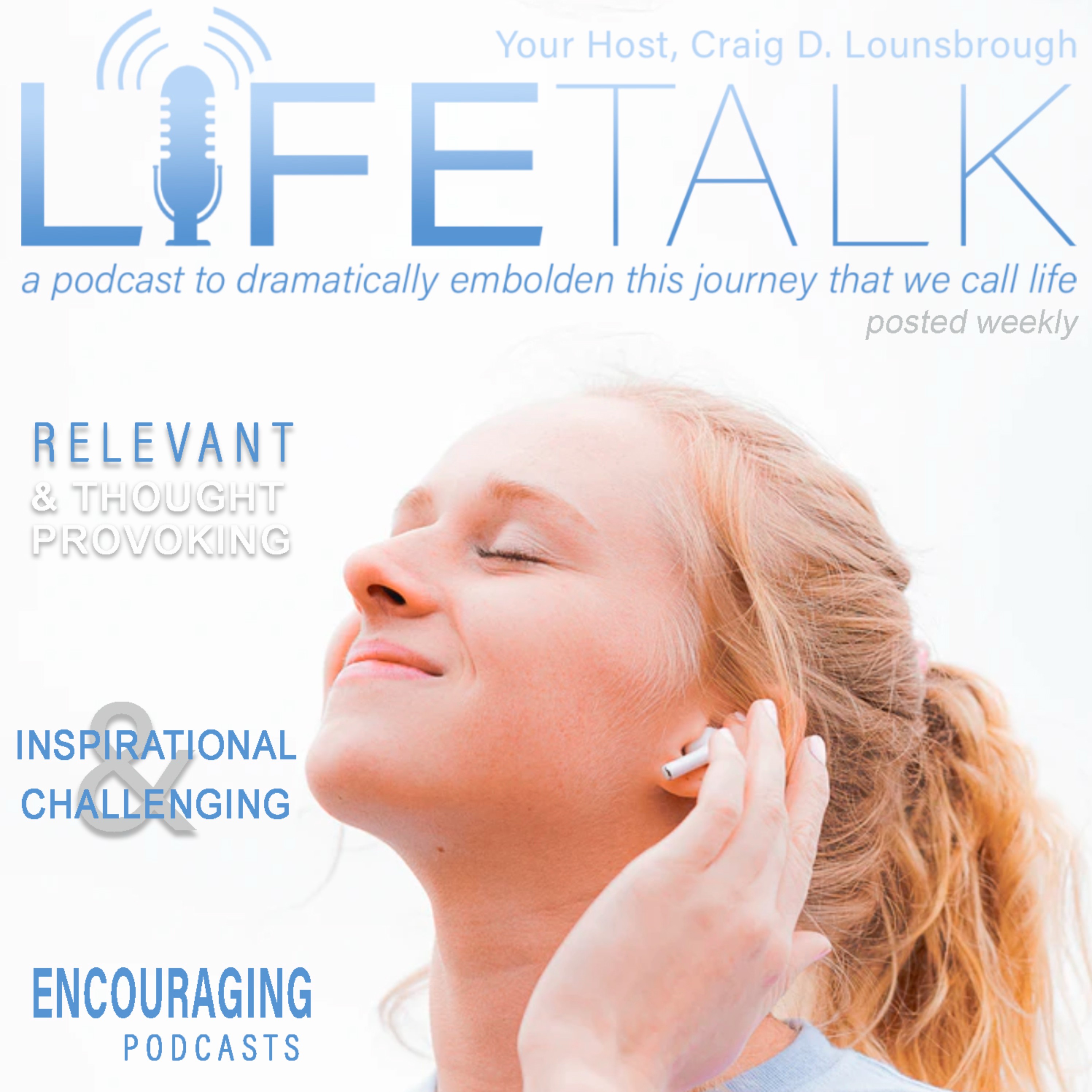Episodes
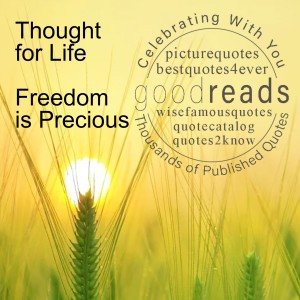
19 hours ago
19 hours ago
LifeTalk's "Thought for Life" is a weekly one-minute thought that touches on one of today's pressing issues. Each of these brief presentations is centered on one of Craig's personal quotes. All of his quotes are specifically written to challenge, inform, and inspire. Today's thought is:
“If I don’t passionately desire freedom for all of my fellowmen, it’s likely that I haven’t been sufficiently freed from my selfishness so that I might see their captivity.”
Follow all of Craig's daily quotes on Facebook, Pinterest, Twitter, Linkedin and Instagram.
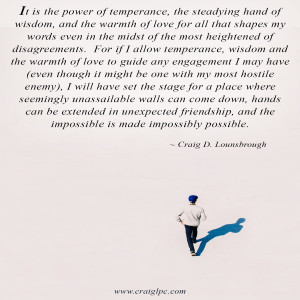
20 hours ago
To Change a Nation - It Begins With Me
20 hours ago
20 hours ago
How do we change a nation? We might start by changing ourselves first. Change begins with us. We know that, but we also doubt that changing us changes much of anything else except us. How far does that kind of change go? Does it really have a broad sweep and a wide impact? Does it really count all that much? In the scope of history, much less the scope of this single day, will it matter? Will it really matter?
Don't underestimate the power of the one person that you are. Don't. Your life is staged to touch many lives. The example that you live out, the principles that you exude, the words that you use, and the battles that you choose to fight or not choose to fight...all of this has an impact. All of it. It is said that one life touches six others in profound ways. And those six others each touch six more. And on it goes. Do not think for a moment that the change you make and the life you live does not have impact. And don't think that that impact doesn't outlive you, for it does and it will. How do we change a nation? Let's start by changing ourselves first.
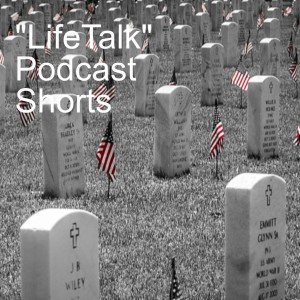
3 days ago
3 days ago
You Are Silent Now -Remembering the Sacrifices
“You are silent now who once stood on battlefields ravaged by destruction unimaginable, holding in those desperate places the line of freedom for others you would never know, and who would never know you. And being one of those you never knew, I would give all I have to clasp your hand one single time, look into eyes that witnessed the bloodied carnage that results when freedom refuses to bow to chains of any kind, and simply say 'thank you.'”
Men and women died in the service of this country. They died. They…died. They gave up their lives. Their futures. Whatever roles that they would have played in their families. They gave up their dreams. They gave up their aspirations. They gave up ever going home again, or walking past the school that they went to as a kid, or enjoying warm summer evenings, or decorating a Christmas tree, or hugging their kids, or planting a garden, or talking to a neighbor over the fence, or a million other things. They gave all of that stuff up. All of it. Now, that all might sound a bit romanticized, particularly for those of us who don’t want to hear it. But it’s what they gave up. In fact, what you and I do every day is what they gave up doing…forever.
So, we are here only because someone else is not. We are here because someone, somewhere paid the ultimate price so that we could be here. So we could have a future. So we could go home at night. So we could walk past our old school. So we could sit outside on those summer evenings, or decorate a Christmas tree, or hug our kids, or plant a garden, or talk to our neighbors over the fence. People died so that we can do all of that stuff. We are here because they are not.
And I don’t know what I would do if I somehow I had to look even one, just one of those people in the face and tell them that I’ve abused what they died for. Or, that I took it all for granted. Or, that I was so callous that I didn’t even think about what they did for me because I’m too caught up in my own agendas to think about anything else. Or, I’ve lived my life thinking that I was owed these freedoms instead of realizing that I’ve been gifted with them. Or, that I’ve used these freedoms for all the things that they should have never been used for. I cannot imagine telling a fallen solider that that is how I used what they died for. I can’t imagine it.
So, maybe it’s a time for reflection. A lot of reflection. Reflection as individuals, as families, as communities, and reflection as a nation. Maybe it’s time to realize what we have. Maybe it’s time to reflect on the sacrifices of people who we will never know who handed us what we have. And maybe we need to reflect on our responsibility to hold all of that with the utmost respect. Maybe, just maybe it’s time to do that.
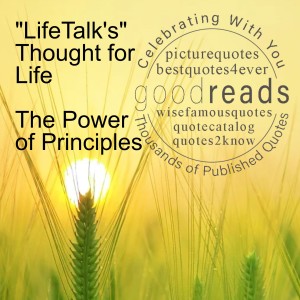
Friday Jun 27, 2025
”LifeTalk’s” Thought for Life - The Power of Principles
Friday Jun 27, 2025
Friday Jun 27, 2025
Welcome to LifeTalk’s Thought for Life. Christianity stands for principles that are not stood for in our culture. It stands for something lofty, but costly. It stands for principles that are timeless rather than those that suit the times. Consider this “Thought for Life:”
“So it is that this man named Jesus handily performed feats that were astounding in their scope and utterly impossible in their nature. And as if that were not enough, He then does something as outrageous as inviting us to a life of doing the same. And yet it would seem that the most astounding and impossible thing of all is for us to blithely reject that invitation in favor of the aching emptiness and endless darkness that rides hard on the heels of just such a rejection.”
I hope that you ponder that thought today. Discover all of my daily quotes on Facebook, Pinterest, Twitter, Linkedin and Instagram.
Additional Resources
Discover an array of additional resources on our website at www.craiglpc.com. Find all of Craig's thoughtful, timely, and inspirational books at Amazon. com, Barnes and Noble, or wherever books are sold. Also, take a moment to explore Craig's Public Speaking Resources for information regarding the resources available to your business, ministry, or organization.
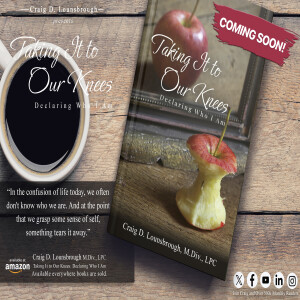
Wednesday Jun 25, 2025
Defined By Our History - Taking It to Our Knees: Declaring Who I Am
Wednesday Jun 25, 2025
Wednesday Jun 25, 2025
Defined By Our History
“The nature of our histories are always secondary to what we choose to do with them.”
- Craig D. Lounsbrough
Our histories impact us. However, what impacts us doesn’t define us. Our histories can scar us, cripple us, leave us plagued with deficits, and reeling from loss. Our histories can leave us with overwhelming insecurities, fears that sabotage our dreams, and a deeply running pessimism that runs rogue over anything that might appear to possess some bit of desperately needed hope. They can leave us with deep-seated trauma, an addiction that won’t relent, an inability to develop meaningful relationships, and a haunting sense that the effects of our past will engulf the whole of our future.
Our histories might define our journey to this point, but they do not possess the power to dictate that journey from this point forward. They might tell the tale of where we’ve been, but they have no power to pave the road to where we’re going.
A New Thing
In Isaiah 43:19 God says, “See, I am doing a new thing! Now it springs up; do you not perceive it? I am making a way in the wilderness and streams in the wasteland.”
The radical boldness in this verse is both rich and raw. The past ends here. Decisively. Right here. In the ‘now’ of our existence. God draws a hard line that halts ‘what was’ and unleashes ‘what will be’. He Who is timeless cuts time in two. The story of yesterday is stripped of the power to pen the script of tomorrow. All is new!
God states that He is “doing a new thing.” Not some slick revision. Not an overhaul. Not something old dressed up to look like something new. Not some clever nip-and-tuck. He is doing a “new thing.” Something revolutionary. Something that sheds the past. Something that peels away the insecurities, crushes the fear, rips away the pessimism, shakes us free of the trauma, and breaks the back of the addiction. God is the great insurrectionist, rising up against the past and crushing it in the rising.
Revolutionary
The tone of ‘something new’ in this verse suggests something unexpected. Something whose newness is so ‘new’ that it breaks the back of our logic and leaves our reasoning entirely out of breath. It’s ‘new’ to the point that it catches us entirely off guard. It’s not something ‘new’ that we might devise or cook up in our heads because there’s typically not a whole lot of anything new in that kind of stuff. Rather, it’s something so wildly revolutionary and so far out-of-the-box that it will defy all of the shortsighted paradigms that we use to make sense of it.
Not Our History
And God does this ‘something new’ because there is no need to be held hostage to our histories. That’s not God’s intent. That’s not His design. The scars, the insecurities, the fears, the pessimism, the trauma, the addictions, the inability to develop meaningful relationships, and the haunting sense that our past will engulf the whole of our future are not who we are. Rather, they are the results of what happened to us.
These things might be how people have come to define us. A spouse, or a friend, or an employer, or a family member, or some random person functioning out of some thoughtless mindset might have slapped these definitions upon us once-upon-a-time. Someone might have looked for some handy way to conveniently define us in a manner that was comfortable for them, and so they cherry-picked some assorted bits of our history and declared us to be those things.
But God is “doing a new thing.” Not a continuation of what was. Not some cheap addendum. Not some hat-trick. But something new. This newness declares that we are not held hostage to the way in which the past has attempted to defined us. We are not sentenced to walk with some impermeable definition that has already determined the nature of our future as well as our role in that future. The ability to be different will always crush that which declares that we will never be different.
Building Blocks
Rather, your past holds the building blocks of your greatness. Your past holds the essential raw materials for the very things that God is determined to build you into. Your past is the resource for your future, not the story of your future. It is a massive storehouse of incalculable assets capable of constructing a fresh tomorrow. Our history is not what defines us. It’s what enlarges us, enlivens us, empowers us, and thrusts us up and out of whatever yesterday was into everything that tomorrow can be. Your past is the accumulation of untapped resources standing ready to be unleashed into your today and delivered into your every tomorrow.
More Than Your History
You are more than your history. No history, despite how massive can define a single human being. You are far more than the accumulation of years, experiences, disappointments, betrayals, losses, frustrations, and failures. The nature of your humanity is vast beyond a hundred lifetimes and a million experiences. You cannot be defined by your past. It’s simply impossible. No one’s past could ever hope to contain enough content to define the limitlessness of their humanity. Yet despite the frequently painful nature of your past, you can be enriched by it. That is what God seeks to do in your life. Behold, He is doing a new thing in you.
Thirty-One I Am Statements
The thirty-one statements made by God Himself declare that you are bound to nothing other than the magnificence of your design. History is the recounting of what has passed, not the declaration of your design.
Conclusion
You will find all thirty-one of these “I Am” statements outlined in my book, “Taking It to Our Knees – Declaring Who I Am.” This book is a fresh, entirely thought-provoking, and richly insightful thirty-one day devotional that will assist you in both discovering and living out your real self. You will find “Taking It to Our Knees – Declaring Who I Am” on Amazon, Barnes and Noble, or wherever books are sold.
Thanks for joining us on LifeTalk today. You will find LifeTalk on most podcast platforms as well as YouTube. I would also encourage you to check out our daily posts on all of our Social Media sites.
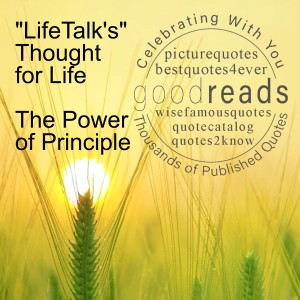
Monday Jun 23, 2025
”LifeTalk’s” Thought for Life - The Power of Principle
Monday Jun 23, 2025
Monday Jun 23, 2025
Welcome to LifeTalk’s Thought for Life. Christianity stands for principles that are not stood for in our culture. It stands for something lofty, but costly. It stands for principles that are timeless rather than those that suit the times. Consider this “Thought for Life:”
“So it is that this man named Jesus handily performed feats that were astounding in their scope and utterly impossible in their nature. And as if that were not enough, He then does something as outrageous as inviting us to a life of doing the same. And yet it would seem that the most astounding and impossible thing of all is for us to blithely reject that invitation in favor of the aching emptiness and endless darkness that rides hard on the heels of just such a rejection.”
I hope that you ponder that thought today. Discover all of my daily quotes on Facebook, Pinterest, Twitter, Linkedin and Instagram.

Friday Jun 20, 2025
Who Are You Giving Yourself Away To?
Friday Jun 20, 2025
Friday Jun 20, 2025
Who are you giving yourself away to? To what propaganda have you come to subscribe? To what bit of media polished bias or refined political spin have you succumb? Who has your ear, and therefore holds the heart to which your ear is attached? What are the voices that have methodically and patiently lulled you into some sort of comatose complacency where you no longer engage this rare, but incredibly precious thing that we call common sense? What podium have you obediently sat in front of that has led you to believe that you cannot think for yourself, or maybe that you can, but that you don’t need to? Who has told you that facts are irrelevant, and that the truth is simply an irritating obstacle to be quickly discarded if they don’t neatly fit on the preferred end of some ever-changing political spectrum? Who are you giving yourself away to?
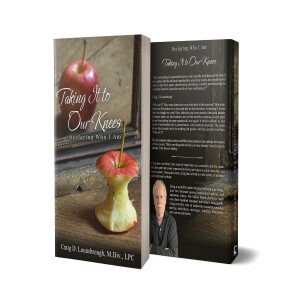
Thursday Jun 19, 2025
Defined By Our Deficits - "Taking It to Our Knees: Declaring Who I Am"
Thursday Jun 19, 2025
Thursday Jun 19, 2025
Defined By Our Deficits
“Any deficit that you have can never stand against the asset that that deficit is waiting to become.”
- Craig D. Lounsbrough
You know, we come to define ourselves more by what we lack than by what we possess. We define ourselves by the successes that we haven’t had, the relationships that didn’t work, the careers that never happened, and the dreams that never got off the ground because they never made it to the runway.
All of these things tell us everything that we are not. The assets that we don’t have. The confidence that we lack. The intelligence that is never intelligent enough. The talents that we don’t possess, and the determination that is never sufficiently determined. We see ourselves as a sad compilation of everything that we are not.
These deficits result in shattered relationships. Shuttered opportunities. Job losses. Financial failures. Addictions. Upended careers. Friendships that went up in flames and the charred remains of families that fell to the same fate. The shame and embarrassment mocks us, telling us that we are everything that is wrong with everything that went wrong.
Surrounded by so many failures that evidence both the depth and number of our deficits, we become defined by those deficits. We feel that there is nothing else that we can define ourselves by. We are lulled (or sometimes thrust) into the belief that we are the sum total of our failures. And soon, believing becomes becoming.
The Power of Thought
Proverbs 23:7 says, “For as he thinks in his heart, so is he…” That’s both incredibly powerful, but wildly dangerous. We become what we think. We think ourselves into who we are. Therefore, we can think ourselves into the deficits that we think about. We can let those things define us until we ourselves are convinced of that definition.
The Question…
The question then becomes, “Who are we really?” Are we defined by our deficits? Is that our lot in life? Is there no escaping the things that we’ve screwed up? Do they leave an indelible mark of defeat and incompetence?
Our Greatest Assets in Disguise
Or, are our deficits are greatest assets in disguise? Is it possible that we are defined far more by the potential that rests in the deficit than the deficit itself? Do the roots of something great lay deep in our worst failures?
Our lives are assets in the making. We are always standing on the verge of becoming something better. Something greater. The ‘better’ in our lives is always just one step away. One decision away. One choice away. On attitude shift away. The ‘better’ is always that close and never any farther away.
The asset that any one of our deficits can become will always be far greater than the deficit from which it arose. Assets birthed of our deficits become the greatest parts of who we are. Taking what we believe to be defeat, seeing the rudimentary elements of victory embedded in that defeat, and turning that defeat into decisive victory is the stuff of true victory.
We’ve Got It All Backwards
God turns life on its head. He reverses the order of things. What is dead dies to death and becomes alive. Water surrenders its fluidity to feet that walk on it. Blindness becomes blinded by light. Legs that limp become legs that leap. Food for thousands from food for one. Millions from pennies. It’s all backwards. Gloriously backwards.
Sin destroys. It’s sets everything back. That’s its single mission and sole agenda. God not only shuts sin down, He throw it in reverse. He works it against itself. As Joseph said to his brothers, “You intended to harm me, but God intended it for good…” It’s all reversed. God walks us back from death to life. From hopelessness to hope. From fear to faith. From lives engulfed in deficits to lives empowered by assets.
We Don’t Think That Way
The problem is, we don’t think that way. Any belief that things might actually work this way is beaten out of us by the messages that our failures have beaten into us. We might visualize stopping something bad in our lives, or at least slowing it down. Maybe we can reign it in or temper it a bit.
But we don’t think in terms of reversals. Radical, impossible, improbable, ingenious, and wildly liberating reversals. Sin says that we can’t do that. God says that we’re supposed to do that.
And So…The Purpose of Deficits
Our deficits were meant to be reversed. That’s what we have them for. And in the reversal they become the assets that we never visualized them becoming. Hidden within our failures there lays all of the composite parts that set the stage for our greatest successes. The worst of us contains the lessons that teach us how to be the best of us. Therefore, our deficits do not define who we are. Rather, they tell us who we can become.
You Are More…
The deficits that define you are the ones that you’ve allowed to define you. God says that you are more than any deficit or combination of deficits. And that ‘more’ is boldly stated in the thirty-one “I Am” statements outlined in the Bible. That ‘more’ is laid out for you to embrace, ingest, and incorporate into your life in wildly wonderful and transformational ways. Your ‘more’ is waiting for you.
Conclusion
You will find all thirty-one of these “I Am” statements outlined in my book, “Taking It to Our Knees – Declaring Who I Am.” This book is a fresh, entirely thought-provoking, and richly insightful thirty-one day devotional that will assist you in both discovering and living out your real self. You will find “Taking It to Our Knees – Declaring Who I Am” on Amazon, Barnes and Noble, or wherever books are sold.
Thanks for joining us on LifeTalk today. You will find LifeTalk on most podcast platforms as well as YouTube. I would also encourage you to check out our daily posts on all of our Social Media sites.
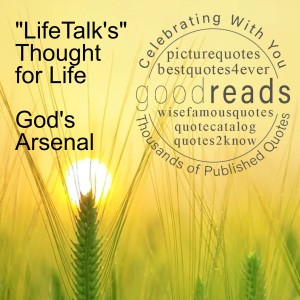
Monday Jun 16, 2025
”LifeTalk’s” Thought for Life - God’s Arsenal
Monday Jun 16, 2025
Monday Jun 16, 2025
Welcome to LifeTalk’s Thought for Life. We spend our lives acquiring what we think we need to fight the battles that we think we’re fighting. In a world fraught with fear and uncertainty, we assimilate whatever grants us this sense of invincibility and power for whatever battle we think we’re fighting. Consider this “Thought for Life:”
“I do not weaponize my life for God by rigorously acquiring an expansive arsenal of sophisticated munitions. Rather, I empty out the arsenal of everything but God, for at that point the arsenal is filled to capacity.”
I hope that you ponder that thought today. Discover all of my daily quotes on Facebook, Pinterest, Twitter, Linkedin and Instagram.
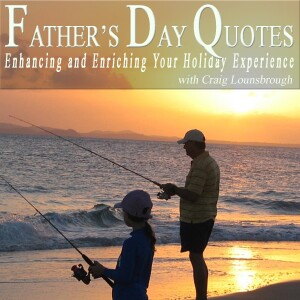
Saturday Jun 14, 2025
Thoughts for Father's Day
Saturday Jun 14, 2025
Saturday Jun 14, 2025
Father’s Day
Some Thoughts
Hi, I’m Craig LounsbroughWelcome to LifeTalk
On Father’s Day week, I want to change the program up a bit and share something a little different on this Father’s Day week. Sometimes it’s a single thought that changes everything. Not some sweeping set of ideas or broad-based philosophy, but a handful of words. Just a handful of words that hold within them an idea that bumps the trajectory of our lives enough to make everything different. Entirely different. And so, we’re gonna take a shot at this in this podcast today.
Let’s begin our Father’s Day podcast by laying a bit of a foundation regarding fathers. You know, as each of us look back, our experiences with our father's differ. Some of us had loving fathers who sacrificed dearly for us. They were always there in exactly the way that we needed them to be there. Others had abusive and painfully disengaged fathers who were there in all the wrong ways. And for yet others, dad was entirely absent
The nature of father's varies widely for each of us. And whether our fathers were everything that we needed them to be, or nothing of what we needed them to be, the role of a father remains absolutely crucial. Likewise, the impact of father either good or bad simply cannot be understated.
Regardless of the kind of father that we might have had, may we always respect both the value and the utterly vital place of father's in a tough, challenging, and increasingly confusing world. May we restore to the role of a father the power and importance of that role. May we yet again understand what a father is whether we experienced that or not.
In order to do that I’m going to share seven Father’s Day quotes with you today. And in doing so, it’s my hope that one or more of these might “bump the trajectory of your life enough to make everything different. Entirely different.” May they remind us of what a father is. And for those of us who are fathers, may they call us to something higher and bolder. Take a moment and think about these:
“A father is the man who can change a world he will not be part of by building the tiny human that is part of him.”
“A father is the man who teaches trembling hands to reach up in search of everything impossible, for he has left his child with the unbridled sense that to do anything less is the greatest impossibility of all.”
“A father is the man who realizes that a life spent in the service of his children is the creation of a legacy so vast that it can be deeply drawn from for generations to come, but it will never be emptied by any who come to it.”
“The true test of a father’s legacy is that it rests in every life except his own, for to leave a true legacy we must divest ourselves of everything so that the investment in our families can be everything.”
“A father of the highest caliber will point the way only because he has walked it beforehand. And in the walking he has meticulously cleared it of all the obstructions that would harm his family in the manner that they harmed him when he first cleared them.”
“A father teaches his children that the battle is not determined by the enemy that stands around them, but by the God Who stands within them. And that lesson can only be driven home as they watch their father stand around them, while God stands within their father.”
One final quote to wrap this up. It reads this way:
“The call of fatherhood is in fact a call of sacrifice, not in some heroic sense where a father is lifted high on some glowing pedestal with all of his sacrifices held up to the awe of those around him. Rather, it is a call that will cost him all that he has, that will be absent of accolades, where rewards will be sparse, and where he will someday find himself having spent all, but in the spending have gained everything. And this is the glory of fatherhood.”
Thanks for joining us on LifeTalk today. You will find LifeTalk on most podcast platforms as well as YouTube. I would also encourage you to check out our daily posts on all of our Social Media sites.
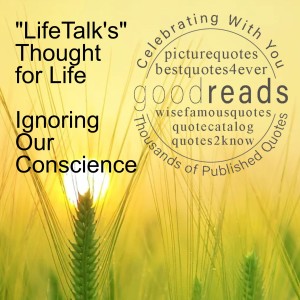
Monday Jun 09, 2025
”LifeTalk’s” Thought for Life - Ignoring Our Conscience
Monday Jun 09, 2025
Monday Jun 09, 2025
Welcome to LifeTalk’s Thought for Life. We ignore our conscience because we want to do what it says we shouldn’t. But, we also ignore the consequences of ignoring it. Consider this “Thought for Life:”
“Disabling your conscience is like disabling your smoke detector. It doesn’t stop a fire. It just leaves you ignorant of the fact that there is one.”
I hope that you ponder that thought today. Discover all of my daily quotes on Facebook, Pinterest, Twitter, Linkedin and Instagram.
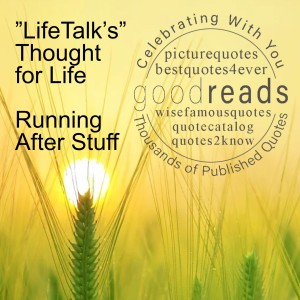
Friday Jun 06, 2025
”LifeTalk’s” Thought for Life - Running After Stuff
Friday Jun 06, 2025
Friday Jun 06, 2025
Welcome to LifeTalk’s Thought for Life. We run after a lot of stuff. Our time, our energy, our finances, and much of our lives are spent chasing stuff. And when we catch that stuff, we typically find that it doesn’t do for us what we thought that it would do for us. Consider this “Thought for Life:”
“The insanity of it all is that the search for that which will fill us incessantly drives us to pursue the very things that will empty us. Yet, the greater insanity is to find ourselves utterly perishing in our emptiness and yet declaring to our dying day that the emptying was the filling. And that is emptiness of the most chilling sort.”
I hope that you ponder that thought today. Discover all of my daily quotes on Facebook, Pinterest, Twitter, Linkedin and Instagram.
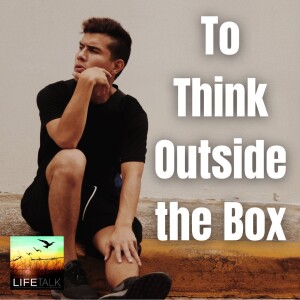
Tuesday Jun 03, 2025
To Think Outside the Box - "In the Footsteps of the Few"
Tuesday Jun 03, 2025
Tuesday Jun 03, 2025
In the Footsteps of the Few
I Was Thinking
To Think Outside the Box
“Every child is an artist. The problem is how to remain an artist once we grow up.”
Pablo Picasso
I think that most of our thinking (despite how much there is to think about) is really pretty standardized and chafingly rote. We think in predetermined patterns and pre-existent templates that require no real thinking. And while there’s a whole lot to think about in this big, wide world of ours…we don’t. Not really.
Why?
Most of this appears to happen because we think within boxes that we randomly (and sometimes not so randomly) borrow. We think within predetermined boxes because they’re convenient and because they’re standardized.
But what if our thinking were to open up fresh venues? And what if life could become a journey not lived within suffocating boxes, but rather an adventure crafted of breathless horizons where there are no boxes? What if?
So, let’s consider some boxes that we tend to get stuck in.
First, The Box of Societal Norms
We think within the box of societal norms. We grant these norms legitimacy because most of the people around us adhere to them in one form or another. Because all these people adhere to them, we naturally grant these norms a morality, assuming that others would not dare embrace them if they weren’t sufficiently ethical or moral. To our relief, we quickly discover that if we think within these boxes we are far less likely to be met with rejection, or ridicule, or disdainful judgement, or some other rather distasteful response. Therefore, the rules of the box rule out the role of thinking.
Second, The Box of the Mundane
We think within the well-worn boxes of the mundane as that path is quite well charted, and therefore void of anything dangerous because other people have figured out where all the dangerous stuff is and either removed it, or they’ve created paths around it. We know that venturing off the path in life is ref with all sorts of calamity that’s just waiting to happen, and so in the box of the mundane there’s nothing to venture off on because there’s one and only one path. It might be mundane, it might go nowhere, but it’s safe (if you happen to define ‘safe’ as refusing to live in order to effectively avoid being hurt). Therefore, the rules of the box rule out the role of thinking.
Third, The Box of Our Fears
We think within the box of our fears, as anything on the outside of those walls is filled with horrific danger (often of the most fabricated sort). We’ve probably ventured out there a time or two, and when we did, we got hurt. And so, when we were hurt, we put our pain on emotional steroids which exponentially magnified our fear. We then took that fear and fashioned a monster that doesn’t exist, and we hunkered down in our box horrified by the fiction of it all. And while the space out there is a whole lot bigger than the infinitesimally tiny space in here, at least it’s safe. Therefore, the rules of the box rule out the role of thinking.
Fourth, The Box of Our Families
We think within the box created by our families as we engaged them growing up. In many unhealthy families, their boxes were shaped by their own demons and assorted hobgoblins that they handed the reins of power over to. Over time, they dutifully passed those onto us. Sometimes these families demand that family members stay within those boxes. Other times, family members may prompt us to move outside of the box because they have come to recognize the life-sucking quality of the box. Yet, while they prompt us to step out, they did not know how to do so themselves. Therefore, the rules of the box rule out the role of thinking.
Fifth and Finally, The Box of Self-Esteem
We think within the box crafted by our low self-esteems. These are often the smallest of all boxes because we dare not create any room whatsoever for anyone else to come in lest they see how pathetically awful we really are. We know full well that there’s great adventure and untapped possibilities outside of our boxes. We can imagine adventure because we’ve imagined it so many times. But we doubt our ability to function in it, or find a place in it, or seize it in the cultivation of our dreams, or much less survive any adventure of any size. Therefore, the rules of the box rule out the role of thinking.
I Was Thinking
I was thinking that there are a whole lot of boxes. Lots and lots of them. But I was also thinking that they are just boxes and nothing more. And as a box, it doesn’t hold us. Rather, we hold it. And when we realize that power and move beyond our boxes, the parameters of our lives will explode exponentially in a manner that we will be free to think about all the many things that this big, wide world of ours has to think about. And so, I think that I really, really want to think outside the boxes.
You will find all of these outlined in my book, “In the Footsteps of the Few – The Power of a Principled Life.” You will find “In the Footsteps of the Few” on Amazon, Barnes and Noble, or wherever books are sold.
Thanks for joining us on LifeTalk today. You will find LifeTalk on most podcast platforms as well as YouTube. I would also encourage you to check out our daily posts on all of our Social Media sites.
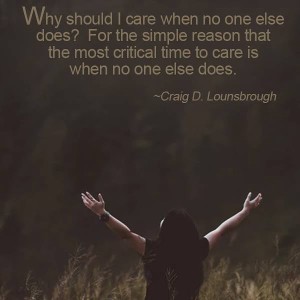
Friday May 30, 2025
Asking the Right Questions Verses Responding for the Wrong Reasons
Friday May 30, 2025
Friday May 30, 2025
Too often we don't take the time to really ask why we support what we're supporting. We get swept up in some energizing movement, or we're utterly captivated by some cause. Something feels inherently good and the premise that drives it appears sound. We find that an army of people have raced to the forefront of this cause, or it's embraced as long overdue, or it appears right for the times.
But in all of that, do we ask the larger questions? Do we ask if there is some underlying issue that's bigger than the cause that prompted it? Is there more here than just the excitement of the moment or the rallying cry of the population? Do we proceed with a wisdom that will solve the larger issues, or will we just perpetuate all of those by running amuck in lesser things? Change is needed. But if it is not thoughtful change, nothing will change.
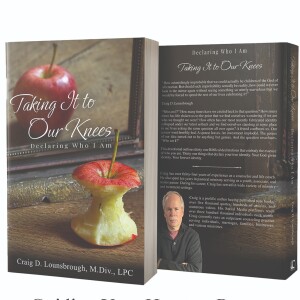
Wednesday May 28, 2025
Not Defined By Our Appearance
Wednesday May 28, 2025
Wednesday May 28, 2025
Defined By Our Appearance
“If the mirror doesn’t give me much back, it’s because it’s not designed to reflect the things within me that make the reflection truly magnificent.”
- Craig D. Lounsbrough
The world has set an airbrushed standard of what we’re supposed to look like. This photoshopped menagerie of idealized versions of a perfected humanity demands something of us that none of us can achieve. Even those whose images are altered to this definition of perfection are themselves nothing of the sort.
The culture defines beauty but it cannot demonstrate what they define as beauty unless they fabricate it. Physical perfection is the illusion that eludes anyone who claims it or pursues it. It’s the design of people who themselves cannot achieve the design that they both create and propagate. This perfection is declared as some pinnacle whose pursuit is the holy grail of our existence. It is decreed as the key that opens doors that will never open for the less desirable. It will elicit favors that the more homely among us can never elicit. In essence, it’s value is non-negotiable.
Misappropriated Investments
Therefore, we rigorously invest in a host of surgeries, a variety of cutting-edge procedures, and an assorted collection of creams and lotions. We sweat through an endless variety of trendy workouts that claim to put us one step closer to this pinnacle of our humanity. We dive into whatever diet that happens to have the blessing of some trending celebrity or health guru. We spend hours preening in front of the mirror. We take thousands of selfies in order to capture just the right angle that accentuates everything that we want to accentuate, and that hides everything that we don’t.
Our interactions with the world around us becomes dictated by a shrewd and entirely exhausting game of flaunting that which we believe to be beautiful and disguising that which we don’t. We are driven to present a pristine self that is pressed, clean, orderly, well-groomed, tight in the right places, and loose in the places that enhance our appearance.
The Priority of Our Appearance
Imagine, if you will, the amount of energy that we invest in our appearance. Imagine the amount of time, money, and personal resources that we squander on what we look like. And with such a grossly disproportionate investment in the external, the internal goes wanting. The essential essence of who we are is left languishing as the red-haired step-child to the physical part of ourselves that can never and will never define the whole of ourselves. We are ambushed by the power of the airbrush
The Vulnerability of the Veneer
Your humanity is too vast to be held hostage to the veneer of your appearance. The essence that you bring to your world is housed in the powerhouse of your humanity, not the smoothness of your complexion. Your abilities will always outclass your body type. Flexing a muscle changes nothing. Flexing your mind can change everything.
The veneers are a pathetic representation of what we think will garner the affection and attention of a world from which we seek acceptance at the sacrifice of self. Veneers are a mortifying trade-off where our desperate need for acceptance drives us to betray ourselves in a deathly exchange of identity for acceptance.
Defining Ourselves By Our Appearance
Despite its destructive nature, this photoshopped menagerie of idealized versions of a perfected humanity reigns over a deluded culture. It is the template by which all other templates are judged, modified or mortified. It is the reflection demanded of every mirror.
Acquiescing to this weak standard, we begin to judge ourselves in relation to that standard. We lay out some sort of culturally-biased continuum in our heads and then we gauge our value based on where we place ourselves on that continuum. We live a life where the entirety of our resources are spent fighting our way up that continuum. The understanding of who we are and any value that we possess becomes based on where we’ve landed on that continuum and how aggressively we’re working our way up it (or have fallen down it).
In the book, “The Self that I Long to Believe In,” I wrote the following:
“Our existence alone is the greatest statement of our worth and the clearest evidence as to our value. What we do with that existence is up to us. But the sheer reality of that existence evidences value. The fact I am writing this and you are reading this attests to the fact that we both have immense value because we both exist to do both of those things.”
That thought is build upon by a later quote in the book which reads:
“Each of us needs to embrace the fact that our value is in who we are. And we need to widen that thought by understanding that this value that we carry within us exceeds our greatest estimation of it. It will readily eclipse anything that we do.”
None of this has anything to do with our appearance. The essence of your greatness is not based on what you look like in any mirror. It’s based on what you want to do with the person that’s in the mirror. It’s ferreting out the rich storehouse of gifts, talents, and abilities that reside within the heart. These will handily eclipse any reflection.
I would go so far as to say that cultivating who you are will lend such a power and vibrancy to your presentation that your physical appearance will be swallowed up in release of who you are. People won’t seek you out because of how you look. They will seek out because you radiate something that swallows up the superficiality of what they’ve spent their lives pursuing.
The Reflection of Your Soul, Not Your Face
“Taking It to Our Knees – Declaring Who I Am” outlines thirty-one “I am” statements that God has made regarding who you are. These are the reflections that have value. These are the reflections that grant our lives the power and sense of satisfaction that no other reflection will be able to deliver. Indeed, they are what’s truly beautiful. They are elegant. Their beauty deepens with age and their power multiplies with time. Your appearance is enhanced to the point that no mirror can contain it or reflect it. That is what the following “I am” statements will deliver into your life, today and every day.
You will find “Taking It to Our Knees – Declaring Who I Am” on Amazon, Barnes and Noble, or wherever books are sold.
Thanks for joining us on LifeTalk today. You will find LifeTalk on most podcast platforms as well as YouTube. I would also encourage you to check out our daily posts on all of our Social Media sites.
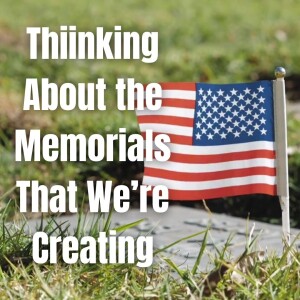
Friday May 23, 2025
Thinking About the Memorials That We're Creating
Friday May 23, 2025
Friday May 23, 2025
Finding Ourselves Somewhere Else
In the Footsteps of the Few
Not Where We Were
It seems that we have some vague and rather ethereal sense of where we’re going in this thing called life. For the more contemplative soul, that sense might be quite refined. For the casual traveler, it might be a bit more nebulous and scattered. For many, where they’re going is defined by the tasks of the day, rather than enlarged by a vision for tomorrow.
In many cases where we’re going is far more rigorously defined by all the places where we don’t want to go, rather than the places where we do want to go. At other times its definition is shaped by the opinions of others, or it’s carved directly from the bedrock of the value systems that have been built into our lives throughout the whole of our lives. In whatever way we do it, we all have some sense of where we’re going. And too often, we find ourselves ending up someplace else.
The Detours We Create
Yet, life is not so predictable as to always wind its way to the places that we presumed it to be going. There are those times when where we were going was mistaken as some sort of final destination when in reality it was only a step to a final destination. At other times the place where we’re going is really a destination that we had fabricated because the place to which life had originally called us appeared too big, or too far, or too steep, or simply impossible in whatever way our limited vision happened to interpret it. Sometimes our destination is to set a course away from our destination so that we can dispense with whatever responsibility or obligation our original destination might have demanded of us. But then there are those other times when life takes a sharp turn that seems little of our actions, nothing of our destination, but everything of circumstances designed to kill our journey and crush our destination long before we get within arm’s length of it.
And then in the magic of life, there are those times where we have actually pursued some authentic destination with such rigor that the trajectory has catapulted us past our destination to places that are everything of our fondest imagination. However, it might play out, we’re all headed somewhere.
The Explanation of Detours Missed
How It Happens
Yet, more often than not it’s the not the obvious shifts in our journey that are the core problem. Sure, life shows up and we get shoved down. There’s no question that the natural ebb and flow of life, whether it be titanic or miniscule, will happen to us. Despite our frequently ego-centric inclinations to the contrary, we are not so shrewd or ingenious as to be able to traverse life in a manner that deftly side-steps everything that comes at us. We don’t dance as well as we think we do.
Casual and Careless
Yet, more often than not, the explanation doesn’t rest in life having shown up. The much more poignant issue is that too often we are passive, flabby and lax in rigorously living out our lives. We’re far too casual and careless. Somehow, somewhere the sanctity of life and the privilege of living it out was supplanted with some sense that it’s too much work or that it’s not going to work, so why try?
Preoccupied with Pabulum
Too often we’re too preoccupied with pabulum. We’re tediously engaged with tiny things and we’re caught in the tedium of minutia because we can gather these things around us and control them when the bigger things are out of our control. Too frequently we’re goaded by the fear of big dreams and massive possibilities, so we dumb down our lives to anesthetize those fears.
Along for the Ride
Frequently we presume that we’re some docile passenger along for a ride that’s going wherever it’s going, so we just let it go to wherever that place is. We freely surrender to passivity which is an invitation to meaninglessness. And meaninglessness is the death of the soul itself. Life is a river, we say. And the best course of action is to navigate it because entertaining the far-fetched notion of swimming against it is utterly preposterous.
The Walls of Denial
At other times, we live in the constructed confines erected from the raw material of denial, causing us to live out a life that is in denial of life itself. We become squatters living in a squatter’s camp constructed by the flimsy materials of justification, rationalization, blame-placing and projecting. We pull in the walls due to the reality that materials of this sort are always pulling inward because they will die if we dare to press them outward. Hemmed in by walls of this sort, the world around us is shut out and moves on without our awareness of it.
Ending Up Where We Wish to Be
We will end up somewhere. The fact that we have a destination is irrefutable as life is a journey that presents us with no option other than the journey. We may decide that the nature and course of the journey is irrelevant, and we may take a backseat to passivity. If we do, we have no right to complain when we end up in some place other than what we may have thought or preferred.
Yet, we can recognize that we are not automatons subject to the flux of the world within which we have found ourselves. It would seem advisable to recognize that we have an obligation to the course that our life is taking, and that along with that obligation we have been granted a profound degree of power to bring to the course. If we succumb to carelessness, or become engrossed by pabulum, or if we just let the ride go wherever circumstances take it, or if we pull close the walls of denial this thing that we call life will wind itself to wherever it’s going with no one at the helm. And that kind of destination cannot be good.
We would be wise to inventory our lives and determine if we are in some way large or small participating in any of these behaviors. If so, we need to root them out and expunge them from our lives. Reclaiming a sense of vision, and then seizing our lives with discipline and intentionality will set us on a path that will land us in places that we’ve dreamt to land. If we don’t, the place we land may not be on any land that we even remotely recognize.
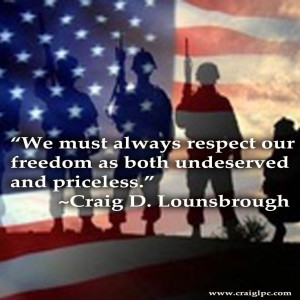
Wednesday May 21, 2025
The Path to Losing Our Freedom
Wednesday May 21, 2025
Wednesday May 21, 2025
Our freedoms are not a "right." They are, in fact, a "privilege." They are not ours to abuse. Rather, they are ours to cherish. But as we abuse these rights by demanding our right to them or exercising them in ways that will destroy these very freedoms, we forget that they are fragile. Very fragile. They are not permanent. They are not guaranteed. They will not stand under the weight of our misuse of them. And if handled inappropriately or abused in one of the many ways that we abuse them, we may someday find ourselves without them.
We are a nation that is losing it's mooring. We are blatantly rewriting our history and thoughtlessly discarding truth in some mad dash of ultimate destruction. We are using our freedoms to destroy ourselves. And I would think that that is the saddest use of these cherished and long-held freedoms that I can think of.
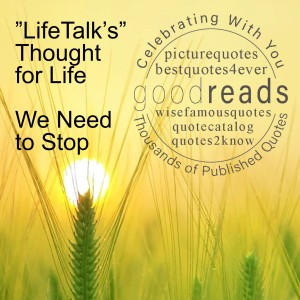
Monday May 19, 2025
”LifeTalk’s” Thought for Life - We Need to Stop
Monday May 19, 2025
Monday May 19, 2025
Welcome to LifeTalk’s Thought for Life. We need to stop. We need to put down our calendars, set our phones aside, strip ourselves of the voices incessantly clamoring for our attention and listen. Just listen. For life is not what we’re chasing. It’s what we’re leaving behind in the chasing. Consider this “Thought for Life:”
“Rich is the person who stops long enough to listen to a bird sing in the celebration of spring, peer into the deep blue of a drowsy summer sky, draw in the pungent aroma of fall’s leaves, and watch the listless kiss of a winter’s snow. For in doing these you have witnessed that which money cannot purchase and man cannot create.”
I hope that you ponder that thought today. Discover all of my daily quotes on Facebook, Pinterest, Twitter, Linkedin and Instagram.
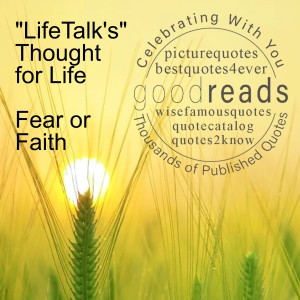
Thursday May 15, 2025
”LifeTalk’s” Thought for Life - Fear or Faith
Thursday May 15, 2025
Thursday May 15, 2025
Welcome to LifeTalk’s Thought for Life. We spend our lives acquiring what we think we need to fight the battles that we think we’re fighting. In a world fraught with fear and uncertainty, we assimilate whatever grants us this sense of invincibility and power for whatever battle we think we’re fighting. Consider this “Thought for Life:”
“I do not weaponize my life for God by rigorously acquiring an expansive arsenal of sophisticated munitions. Rather, I empty out the arsenal of everything but God, for at that point the arsenal is filled to capacity.”
I hope that you ponder that thought today. Discover all of my daily quotes on Facebook, Pinterest, Twitter, Linkedin and Instagram.
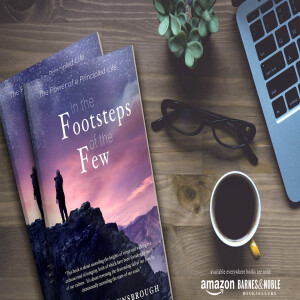
Tuesday May 13, 2025
Finding Ourselves Somewhere Else - "In the Footsteps of the Few"
Tuesday May 13, 2025
Tuesday May 13, 2025
Not Where We Were
It seems that we have some vague and rather ethereal sense of where we’re going in this thing called life. For the more contemplative soul, that sense might be quite refined. For the casual traveler, it might be a bit more nebulous and scattered. For many, where they’re going is defined by the tasks of the day, rather than enlarged by a vision for tomorrow.
In many cases where we’re going is far more rigorously defined by all the places where we don’t want to go, rather than the places where we do want to go. At other times its definition is shaped by the opinions of others, or it’s carved directly from the bedrock of the value systems that have been built into our lives throughout the whole of our lives. In whatever way we do it, we all have some sense of where we’re going. And too often, we find ourselves ending up someplace else.
The Detours We Create
Yet, life is not so predictable as to always wind its way to the places that we presumed it to be going. There are those times when where we were going was mistaken as some sort of final destination when in reality it was only a step to a final destination. At other times the place where we’re going is really a destination that we had fabricated because the place to which life had originally called us appeared too big, or too far, or too steep, or simply impossible in whatever way our limited vision happened to interpret it. Sometimes our destination is to set a course away from our destination so that we can dispense with whatever responsibility or obligation our original destination might have demanded of us. But then there are those other times when life takes a sharp turn that seems little of our actions, nothing of our destination, but everything of circumstances designed to kill our journey and crush our destination long before we get within arm’s length of it.
And then in the magic of life, there are those times where we have actually pursued some authentic destination with such rigor that the trajectory has catapulted us past our destination to places that are everything of our fondest imagination. However, it might play out, we’re all headed somewhere.
The Explanation of Detours Missed
How It Happens
Yet, more often than not it’s the not the obvious shifts in our journey that are the core problem. Sure, life shows up and we get shoved down. There’s no question that the natural ebb and flow of life, whether it be titanic or miniscule, will happen to us. Despite our frequently ego-centric inclinations to the contrary, we are not so shrewd or ingenious as to be able to traverse life in a manner that deftly side-steps everything that comes at us. We don’t dance as well as we think we do.
Casual and Careless
Yet, more often than not, the explanation doesn’t rest in life having shown up. The much more poignant issue is that too often we are passive, flabby and lax in rigorously living out our lives. We’re far too casual and careless. Somehow, somewhere the sanctity of life and the privilege of living it out was supplanted with some sense that it’s too much work or that it’s not going to work, so why try?
Preoccupied with Pabulum
Too often we’re too preoccupied with pabulum. We’re tediously engaged with tiny things and we’re caught in the tedium of minutia because we can gather these things around us and control them when the bigger things are out of our control. Too frequently we’re goaded by the fear of big dreams and massive possibilities, so we dumb down our lives to anesthetize those fears.
Along for the Ride
Frequently we presume that we’re some docile passenger along for a ride that’s going wherever it’s going, so we just let it go to wherever that place is. We freely surrender to passivity which is an invitation to meaninglessness. And meaninglessness is the death of the soul itself. Life is a river, we say. And the best course of action is to navigate it because entertaining the far-fetched notion of swimming against it is utterly preposterous.
The Walls of Denial
At other times, we live in the constructed confines erected from the raw material of denial, causing us to live out a life that is in denial of life itself. We become squatters living in a squatter’s camp constructed by the flimsy materials of justification, rationalization, blame-placing and projecting. We pull in the walls due to the reality that materials of this sort are always pulling inward because they will die if we dare to press them outward. Hemmed in by walls of this sort, the world around us is shut out and moves on without our awareness of it.
Ending Up Where We Wish to Be
We will end up somewhere. The fact that we have a destination is irrefutable as life is a journey that presents us with no option other than the journey. We may decide that the nature and course of the journey is irrelevant, and we may take a backseat to passivity. If we do, we have no right to complain when we end up in some place other than what we may have thought or preferred.
Yet, we can recognize that we are not automatons subject to the flux of the world within which we have found ourselves. It would seem advisable to recognize that we have an obligation to the course that our life is taking, and that along with that obligation we have been granted a profound degree of power to bring to the course. If we succumb to carelessness, or become engrossed by pabulum, or if we just let the ride go wherever circumstances take it, or if we pull close the walls of denial this thing that we call life will wind itself to wherever it’s going with no one at the helm. And that kind of destination cannot be good.
We would be wise to inventory our lives and determine if we are in some way large or small participating in any of these behaviors. If so, we need to root them out and expunge them from our lives. Reclaiming a sense of vision, and then seizing our lives with discipline and intentionality will set us on a path that will land us in places that we’ve dreamt to land. If we don’t, the place we land may not be on any land that we even remotely recognize.
Thanks for joining us today. You will discover “In the Footsteps of the Few – The Power of a Principled Life,” as well as all of my books on Amazon, Barnes and Noble, or wherever books are sold. It’s my hope that you find these books are meaningful and restorative in your life. Also, visit us daily on all of our Social Media sites to find inspirational quotes and videos.
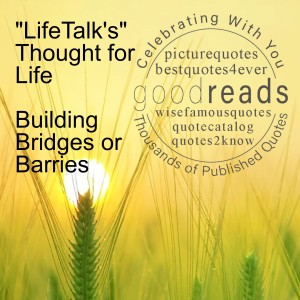
Monday May 12, 2025
”LifeTalk’s” Thought for Life - Building Bridges or Barries
Monday May 12, 2025
Monday May 12, 2025
Welcome to LifeTalk’s Thought for Life. We build bridges or barriers. If you think about it, everything that we do builds one or the other. And the function of a bridge is quite different than the function of a barrier. Consider this “Thought for Life:”
“Every decision will build a bridge or a barrier. Therefore, what stands in front of you at this moment illustrates the decisions that you made on your way to this moment.”
I hope that you ponder that thought today. Discover all of my daily quotes on Facebook, Pinterest, Twitter, Linkedin and Instagram.

Thursday May 08, 2025
A Mother's Day Letter
Thursday May 08, 2025
Thursday May 08, 2025
Dear Mom:
I realize that on days like Mother’s Day people tend to wax nostalgic, venerating those Mom’s among us who have passed. It is, I suppose, a way to express both our deep respect and enduring gratitude, while somehow holding you a bit closer in heart and mind since we can no longer hold you in our arms.
Mom, you are missed more than the reach of words and the span of syntax can hope to explain. Yet if it were our choice, if your three boys had the power and authority to choose, even then we would not wish you here for you are truly home in a truly perfect and inexplicable way.
Mom, your voice here is now muted, heard only in our hearts, our memories, and throughout the grand halls of heaven. Even so, we still hear it. And when it fades in the frequently stifling noise of life, we play it over in our minds so as not to forget it. Your wisdom now arises from the many footprints you left across the landscape of our lives, examples that speak life and truth and love and ceaseless hope into both the barren places, as well as those places wonderful and lush that we walk through daily. Your touch is lost to us, those simple hugs from a simple woman who not only knew how to love, but how to express it in a way that made each moment warm and safe. It is one thing to be loved. It is quite another to know that you are loved. We knew. And now standing so many years removed from your passing, we still know.
But Mom, in the balance we have gained infinitely more. You left a legacy in our lives; a robust legacy that embodies integrity, honesty and tenacity. A brave legacy that boldly, even brashly believes that God always provides, always cares, always knows and is an ever-present source from which every need will always be met. You helped us understand that life ebbs and flows, sometimes magically and sometimes cruelly. You showed us that life at times invites us to a grand dance, and at other times it seems to slam us to the dance floor leaving us cringing and bleeding. Life pours into us, and then it draws out of us. The sun at times warms us and then the hail pelts us. In whatever form it takes, you taught us that God always prevails, that there is always good, that it will always, always work out. And it always did.
You left us an unrelenting understanding that life is more than some daily routine, or the achievement of tasks either great or small. Life is about living well, living with respect, living in a manner that adds rather than detracts. It is not about pretending things are well or being Pollyannaish. You taught us that life is about understanding that things will not always be fair nor will life necessarily be just, but in the hands of God it will always present us with opportunities to learn about ourselves, to grow and to add something to those around us.
Mom, all of these lessons came packaged in simple things like iced tea on sweltering summer days and hot chocolate on frigid winter nights. It was bedtime prayers that started “now I lay me down to sleep . . .” It was endless lunches packed for school, dimes tucked in lunch boxes for white milk during the week and chocolate milk on Friday’s. It was planting flowers in Spring’s sweet soils, and canning fruit when Fall generously yielded up the bounty born of those soils. It was wrapping us thick in mounds of coats and lengthy scarves when winter drew nature to sleep, and vacuuming the pool when the glory of summer ran and skipped through our days. It was summed up in a tiny plaque that still hangs in the kitchen which reads, “Bless this house oh Lord we pray, make it safe by night and day.” Such was your life.
It was being home when the street lights came on, carrying the laundry up the stairs, and not hitting our brothers. It was your voice calmly and yet quite firmly saying, “quit teasing the dog.” “This didn’t get broken by itself.” “Did you call your grandmother?” “If your friends jumped off a cliff would you follow them?” “Would you please flush the toilet?” “Did you get your homework done?” “Please put your clothes in the dirty clothes hamper.” “Don’t listen to your brother.” “Who left the lights on?” “Please pick up your room.” “Were you born in a barn?” “I didn’t raise you kids to be like this!” “Who tipped over the Christmas tree?” And, “it didn’t walk away by itself.”
Underlying it all, being spoken with undeniable clarity there were these messages. “I love you.” “You can achieve anything you want with your life.” “You kids are God’s gift to me.” “You’re the best kids in the world.” “I don’t deserve you boys.” “I’m praying for you.” “How can I help you?” “How are you doing?” “Do you need anything?” “I’m so proud of you boys.” It was all of those things, and so much more.
Mom, you were about the stuff of building the lives of three boys and taking care of a husband who was, at those rather impetuous times, a boy himself. It was really never about you. We tried to make it about you so many times, but you always politely declined. Rather, it was a selfless investment, pouring your life, your energies and fiber of your being into three boys who really had no clue what you were doing until they themselves were adults. Even today we are unable to fully fathom the depth of your sacrifices. While I would wish to say otherwise, I doubt that we will ever understand them fully.
We again commit to you on this Mother’s Day that we will strive to selflessly pour into the lives of others that which you so graciously poured into our lives. We know that any such efforts on our parts will pale indeed to the way in which you poured yourself into our lives. Know that we are committed to drawing from the innumerable footprints that you left, the lessons taught and lived, and the insights imparted. We will draw from the vast storehouse of memories packed tight with words, mental pictures, ceaseless emotions and warm thoughts. And we will live that out Mom, as we have for so many years since you passed. We will bring your life to the lives of our families, the people who populate our careers, and to those we meet in the briefest passing. You will live on Mom, here as well as in the marbled halls of heaven. You will touch innumerable lives through your three boys who you loved, equipped, nurtured, guided, guarded and then launched.
One final thing Mom; we want you to know that we will live each day in anticipation of seeing you again. However, we commit that we will not let that anticipation somehow diminish the efforts and energies we invest in living life. We will not live in some sort of distracted state, focused solely on the idea of seeing you again and awaiting that moment in such a way that the present moment is squandered. Rather, we will invest our lives vigorously while holding fast to the promise of scripture that there awaits for us a grand reunion, a wild celebration of relationships restored in a creation likewise restored. In the meantime Mom, know that you are loved, that you are fondly remembered, that you live on in us and that when stories of you are told, they will be told with the greatest love and deepest admiration.
Thanks Mom. We love more than simple words could hope to convey. God bless and see you soon.
Thanks for joining us on LifeTalk today. You will find LifeTalk on most podcast platforms as well as YouTube. I would also encourage you to check out our daily posts on all of our Social Media sites.
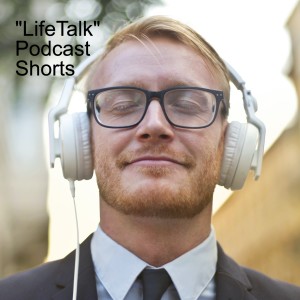
Wednesday May 07, 2025
Podcast Short: Am I Passionate for the Right Things?
Wednesday May 07, 2025
Wednesday May 07, 2025
Am I Passionate for the Right Things?
“In full uniform, the color guard marched by as part of the parade. And as they did, he forced his horribly slumped and deeply aged body out of his worn wheelchair and stood to ram-rod attention. He held a salute until the guard had passed, and then he feebly collapsed back into his wheelchair. As I stared in ever-warming admiration, emblazoned across his hat I saw the words “WWII Veteran.” And while I deeply admire his stirring passion for our country, I stood there wishing that my passion for the cause of Christ might someday be strong enough to lift me out of the many wheelchairs within which I sit.”
Am I passionate for the right things? Not just passionate. But passionate in the right way. Sure, there’s a lot of voices out there. There’s a lot of causes out there. There’s a lot of yelling, and screaming, and arguing, and hostile behaviors, and noisy propaganda, and a bunch of edgy people on more than one rant advocating for these causes. On top of that, the causes themselves shift depending upon the temperature of the culture, or the agenda of the people pulling long strings behind closed doors. There are causes that represent the demands of a handful of people who find the foundations of their cause so ill-defined or fragile that constructive dialogue is replaced with destructive actions. Greed is rampant. Power-mongering runs wild. Principles have been discarded because they impede the progressive thinking that end up resulting in regressive outcomes. And in this mess and in the midst of all of this noise, am I passionate for the right things?
Consider this. There are some things that are timeless. There are some things that are woven into this existence that you can’t remove. There are principles and ethics that are foundational. You can try and remove them, but there’s a huge cost to that. Civilizations throughout history have messed with them, or attempted to adjust them to suit a particular cause, or worked to rid their culture of them altogether. And the outcomes are never good. History will tell us that rather plainly, if we’re willing to be honest about history.
And so, I want to be passionate about something that’s timeless, because I want it to live on beyond my life. Something that this culture can reliably build on both today and tomorrow and for every tomorrow after that. Something that’s certain to sustain my kids and grandkids and great-grandkids. And nothing that we can create on our own will do that. What we create is too weak, and too fragile, and too shallow, and too lackluster to do that. That kind of stuff is only something that God can create.
And so, it’s this God and what He created and principles that He built it all around, it’s that stuff that I choose to be passionate about. Not man-made stuff because that doesn’t last. Rather, it’s God-created stuff. It’s the principles that shaped this existence at its core that I will surrender my passions to and be passionate about. Because if I’m not passionate about that stuff, passion won’t matter because very shortly nothing will.
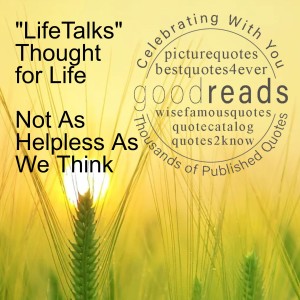
Monday May 05, 2025
”LifeTalks” Thought for Life - Not As Helpless As We Think
Monday May 05, 2025
Monday May 05, 2025
Welcome to LifeTalk’s Thought for Life. Sometimes we feel helpless. In the midst of tragedy, or painful losses, or devastating moments, we often feel that we are helpless to do anything other than standby and watch. Yet is that really all that we can do? Consider this “Thought for Life:”
“Prayer inserts me into the middle of any battlefield regardless of how gruesome or bloodied. And in the carnage of whatever that battle might be, it allows me to deliver a force greater than any raging on that field.”
I hope that you ponder that thought today. Discover all of my daily quotes on Facebook, Pinterest, Twitter, Linkedin and Instagram.
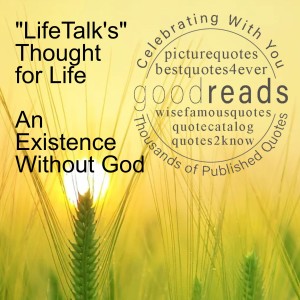
Friday May 02, 2025
”LifeTalk’s” Thought for Life - An Existence Without God
Friday May 02, 2025
Friday May 02, 2025
Welcome to LifeTalk’s Thought for Life. It’s my sense that God doesn’t need me to speak to you. He’s quite capable of doing that without me. But there are times when I sense that He wants me to speak something of Him to you. And this is one of those moments. Consider this “Thought for Life:”
“I don’t always preach God, for His existence is obvious. Rather, I preach what will happen to our existence if we deny His.”
I hope that you ponder that thought today. Discover all of my daily quotes on Facebook, Pinterest, Twitter, Linkedin and Instagram.
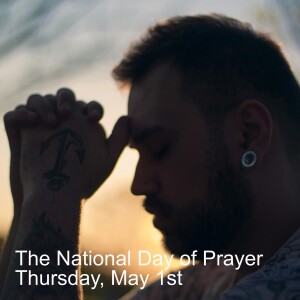
Thursday May 01, 2025
The Unrecognized Potency of Prayer
Thursday May 01, 2025
Thursday May 01, 2025
Let’s start here. Think about this thought:
“Too often we have stripped our single greatest asset of its power and hobbled it to the degree that it has come to be viewed only as a pathetic last resort. Yet despite our incessant meddling, this asset nonetheless remains a first resort so potent that it never needs a last one. And that asset is prayer.”
Prayer. You know, through our own lack of understanding and discipline, we’ve granted prayer the characteristics associated with some antiquated religious monk living in some secluded monastery off in the woods. For us, prayer sits on the far fringes of life as some traditional nicety that we toy with when we’re not wrestling with bigger things. It might serve a purpose in life’s special moments, or in the midst of life’s most dire emergencies, but even then we’re not all that confident that it actually brings anything to either. To varying degrees we’ve rendered prayer as culturally outdated, logistically outmoded, a backburner endeavor, and far too simplistic to grapple with the monumental realities that are part of living in the 21st century.
But I would challenge all of that by saying this:
“I am convinced beyond words to convey that prayer is infinitely more than the mindless ranting of some poor, delusional soul talking to some imaginary friend in some imaginary place. Oh, to the contrary. Prayer is the manifest pleading of a soul worn raw that, by the simple act of prayer, unleashes untold forces that we can’t imagine that surge in a descent so massive and so inconceivably powerful that the ground of everything before them shakes. And in this descent lives are changed beyond recognition, nations are transformed beyond comprehension, and history is brought to its knees in the face of a God who says, “be healed.” That, my friend, is nothing of a delusional soul or imaginary friend or any other such nonsense.”
That is what prayer is. But let’s build on that. Consider this:
“How do I tell you what prayer is? It is everything that I need every time I kneel in the practice of it. It shakes the infinite alive and sets its armies afoot in defense of me. It will never run aground or find itself drowning in the waters of the adversity that I bring to it. Nothing it faces is insurmountable, for to think that such an adversary exists is to run a fool’s errand. It will shield me in its advance, it will beckon me to anticipate the miracles that it is about to wield, and in the midst of it all it calms me as it whispers, 'Be still and know that I am God.' And because of these reasons and a million more, I find prayer the single greatest place that I could ever imagine being.”
That’s what prayer is. And if that’s not what prayer is in your life, or if that’s not what your experience of prayer is, then you’ve missed one of the powerful things that we have the privilege of engaging in. We’ve settled for this slumlord existence of spiritual impoverishment when we can be spiritually rich in ways that give light, and energy, and meaning, and purpose to life.
Enjoy LifeTalk's wide array of inspirational and timely programs on most podcast platforms. You can also enjoy his daily quotations on Facebook, Pinterest, X, Instagram, and LinkedIn. __________________________________________________________________________________
You will discover all of Craig's books on Amazon, Barnes and Noble, or wherever books are sold.
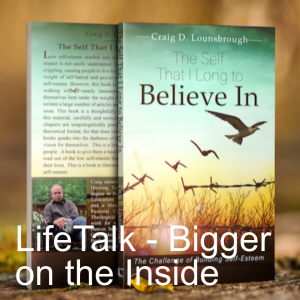
Wednesday Apr 30, 2025
Bigger on the Inside - The Self That I Long to Believe In
Wednesday Apr 30, 2025
Wednesday Apr 30, 2025
The Self That I Long to Believe In
Bigger on the Inside Than the Outside
Attempting to Define Success to Define Ourselves
“It would make sense that our worth should be, and in reality is based on something that cannot be proven for any other reason than its value lies forever beyond the most magnificent achievements that would serve to even remotely evidence it.”
Success has been accorded an endless array of definitions. Some of them are crafted to make failure seem more like success so that we can limp through life and fail without remorse or guilt. Other definitions are quite lofty, written to give us opportunity achieve in a manner that has little to do with the achievement and everything to do with restoring blunted self-esteems. At times success is defined by whatever will accord us the accolades of others or advance us socially or professionally. At yet other times, the definition of success is more about giving ourselves a sorely needed boost when our spirits have been lagging.
Lost in the Array of Definitions
Whatever and wherever their source, a dizzying array of definitions abound. Many seem to be a target created after the trigger was pulled, making every decision a bulls-eye even if the aim was horrid. Some are thrown out because they’re easy, or we’re not certain what success is so we just come up with something that might pass for success if people don’t pay too much attention. And in the squalor of definitions gone awry and rogue, we seem to have lost a genuine definition of success.
Why Success?
It's interesting that success, in whatever manner it is defined, has come to define our worth and value. That’s why a lack of perceived success will tank our self-esteem quicker than just about anything else. Success appears to have become the litmus test as to the credibility of our existence and the unforgiving gauge of our worth. Success has evolved into the exclusive commodity by which we ascribe value to ourselves and others.
Fear of Questioning the Definition
Success becomes so acutely defined and so irrevocably defining that we seldom entertain any other possible definition. We find ourselves entangled in the culturally mandated definition of success, or the definitions imposed by our families or friends or occupation. We become so absorbed in the sorting out and the achieving of those definitions that the endeavor to achieve them becomes inordinately consuming. But what does this mean in terms of how we’ve come to identify who we are and in that, how we’ve attempted to determine the value of who we are?
The Flaw of Success
Yet, the nature of such a mentality of success demands that we constantly achieve. It is an effort of insanely perpetual works that requires that we continually prove our worth as the previous success eventually fades sufficiently to demand a new one. Sure, we can define it. But success as used to determine our worth and value is always temporal. It’s always moving. Therefore, we become enslaved to successes that demand nothing more than other successes.
We Are Too Big to Be Defined By Any Success
Our value is not based on ‘what we do.’ Rather, it is based on ‘who we are.’ If we remain stuck with the feeling that our worth is based on ‘what we do,’ the definition of success is what lends credence to those efforts.
Success is irrelevant in respect to our self-esteem as any definition of success regardless of how lofty does not possess the power to sustain our sense of worth or feed our sense of value. When it comes to our sense of worth and value, success is the thing that’s not the thing. It’s been marketed as the snake oil for our self-esteem by the carpetbaggers of our culture, but it’s snake oil only.
Success cannot do what it promises to do. With such an apparently irreconcilable flaw in its makeup, it would be worthwhile to postulate that our worth must be based on something significantly more consistent and profoundly more fundamental than success.
Value Based on Who We Are
Maybe we should dare to consider that our worth does not need to be established either by effort or definition. Maybe we should consider the possibility that it has never ‘not’ been established. That success was achieved by the fact that God decided to designed us and then deliver us into a far larger design to make an impact in and upon that design. We’re here, and that itself is a success.
Everything that we do from here forward is not about success, for success has already been achieved by the fact of our existence. It’s about calling. It’s about fulfillment of the purpose that we’ve been given the privilege to fulfill. It’s about honing in on our purpose and purposefully carrying it out. It’s about obedience to the call, not the adherence to some definition that measures our obedience to the call. It’s doing all of that knowing that our worth and value exists by virtue of the fact that we exist. From there on out, it’s about the doing and not about the proving.
Thinking a Bit More Deeply
It would therefore be wise to consider the possibility that our worth is based on something so profound and unerringly rich that its worth singularly speaks for itself. Something that does not need to be proven simply because it is established in a manner that the need of proof is the weakness of our vision and not the fact of reality. It would make sense that our worth should be, and in reality is based on something that cannot be proven for any other reason than its value lies forever beyond the most magnificent achievements that would serve to even remotely evidence it.
Achieving for Sheer Pleasure, Not Proof of Value
We would be wise to embrace the liberating reality that we can achieve in life for the sheer pleasure of achievement, rather than as a despairing effort to establish our worth. We can walk through life with vigor and tenacity out of a sense of worth, not out of some desperate effort to prove our worth. We change things and we change the course of things because we have been privileged to possess both the ability and the permission to do so. Life is engaged, energized and inspired by our worth, rather than depleted in the pursuit of it. Our days are lived embracing the reality that our value is based on who we are, and to embrace that liberating reality is to embrace a life liberated.
The Viciousness of Low Self-Esteem Explained
If we cannot embrace this indispensable reality, we will be irreversibly stunted by the limitations of the achievements we pursue. We will chain our potential to the baseness of achievements. When we do, the infinite worth that defines us will be forever overshadowed by the shallowness of achievements, for the greatest achievements will never come close to reflecting our true value. Your value is based on who you are, despite what you do. And that is a critical but glorious shift that we each must make.
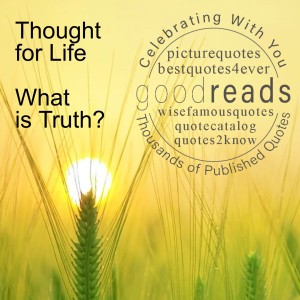
Thursday Apr 24, 2025
”LifeTalk’s” Thought for Life - What is Truth?
Thursday Apr 24, 2025
Thursday Apr 24, 2025
LifeTalk's "Thought for Life" is a weekly one-minute thought that touches on one of today's pressing issues. Each of these brief presentations is centered on one of Craig's personal quotes. All of his quotes are specifically written to challenge, inform, and inspire. Today's thought is:
“Decisions based on timeless truths will never leave our tomorrow regretting the decisions of our yesterday, for such truths will always supersede any ‘then’ or ‘now.’”
Follow all of Craig's daily quotes on Facebook, Pinterest, Twitter, Linkedin and Instagram.
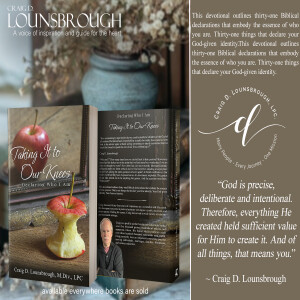
Tuesday Apr 22, 2025
Taking It to Our Knees - Defined By Our Self-Esteem
Tuesday Apr 22, 2025
Tuesday Apr 22, 2025
Defined By Our Self-Esteem
“I can only imagine how much low self-esteem has robbed us as individuals and ransacked our culture. It is a rogue beast bent on diminishing us to some point of forlorn incapacity. Plagued by this beast, we live out marginalized lives that surrender the accomplishments and forsake the achievements that could have been ours. We grope through this existence meagerly living out each day by surviving each day, rather than realizing that we can live with an intensity that will have caused the day to finish having survived us.”
- Craig D. Lounsbrough
From “The Self That I Long to Believe In”
Hi, I’m Craig Lounsbrough
Welcome to LifeTalk
We are not defined by the worst-case assessment of ourselves, although we tend to render just such an assessment. We hand-pick the worst of ourselves to define the whole of ourselves. We do that because the worst of ourselves always seems to render the best of ourselves less than whatever best it might actually be.
Our attitudes trend toward the downside of whoever it is that we are. The deficits. The failures. The reversals. The relationships that never happened or shouldn’t have happened. The goals that fell to the things that got in the way. Dreams that were crushed under the heel of reality. Choices that turned sour. Careers that died at the hands of corporate wrangling. Opportunities squandered. Surrender to fear when we should have feared the idea of surrender. We trend toward our interpretation of what these things say about us.
The Application of Our Interpretations
Once we’ve developed these interpretations of ourselves we apply them liberally. Their repeated application creates a negative skew where everything is painted in undesirable and self-defeating tones. The best of us never escapes the interpretation of the worst of us. Some small and commonplace error becomes catastrophic. An inconsequential misstep evidences our unworthiness. The normal hit-and-miss of life is turned into a relentless barrage of not so friendly-fire where we cut ourselves to ribbons.
Defined by a Fraudulent Identity
In time and over time we come to believe ourselves to be who and what we’ve told ourselves we are. We become convinced of our own self-deprecating narrative. The fictional account becomes the non-fiction of our existence. We find ourselves unable to entertain any other possible interpretation of who we are and who we can yet become. We cannot comprehend another story.
An Authentic Script
We become locked in a story not our own. We play a role fabricated of a false self. We continually force ourselves into alignment with this story because we have come to believe that the ‘force-fitting’ is actually some sort of self-actualizing struggle.
We Are More
No narrative can capture the whole of who you are. And no narrative can destroy that either. The vastness of your humanity will always escape the scope of any words that we might use to either define it, or hold it hostage. In the same vein, the narratives crafted by our deficits, our failures, the reversals, the relationships that failed, the goals that fell, the dreams that were crushed, the choices that turned sour, the careers that died, the opportunities that were squandered, our surrender to fear…none of these can craft a narrative even remotely capable of embodying the entirety of who we are.
You are vaster than everything that would seek to define you, even if the person that’s doing the defining is you. In speaking to God, the Psalmist said, “I praise you because I am fearfully and wonderfully made…” That’s your narrative. That’s your story. That’s who and what you are.
You aren’t just one of many. You’re not just another person walking around on a planet populated by eight billion other people who are just walking around as well. You are “fearfully and wonderfully made.” Your design is the product of an infinite genius crafting a one-of-a-kind human being whose skill-sets and attributes were specifically fashioned to impact the point in history into which you were placed. That’s your story. That will always be your story.
I would have you think about this. Read this carefully and slowly:
“Whatever you see within yourself, let it be the whole of yourself. For too often we have been brutalized by our own sense of inadequacy and we’ve been held hostage to the lesser choices born of such a debilitating sense of self. Know this, that latent within you there lies more than ample resources begging to be called forth to smash the chains forged of such an incapacitating sense of self. And it is my prayer that you would press against everything within you that would hold you back, and that you would raise whatever voice you have and extend that call.”
- Craig D. Lounsbrough
From “The Self That I Long to Believe In”
Thirty-One I Am Statements
The thirty-one statements made by God Himself declare that you are bound to nothing other than the magnificence of your design. Any low self-esteem only serves to mask the greatness within you.
You will find all thirty-one of these “I Am” statements outlined in my book, “Taking It to Our Knees – Declaring Who I Am.” This book is a fresh, entirely thought-provoking, and richly insightful thirty-one day devotional that will assist you in both discovering and living out your real self. You will find “Taking It to Our Knees – Declaring Who I Am” on Amazon, Barnes and Noble, or wherever books are sold.
Thanks for joining us on LifeTalk today. You will find LifeTalk on most podcast platforms as well as YouTube. I would also encourage you to check out our daily posts on all of our Social Media sites.

Friday Apr 18, 2025
New Beginnings - Seeds in Pain
Friday Apr 18, 2025
Friday Apr 18, 2025
New beginnings. The way our lives frequently go, we doubt the existence of new beginnings...at least for us. We've had too much loss, far too much pain, and circumstances that seemed anything but kind to us. And as we look down the road of our lives, we can only envision more of the same. We really don't believe in new beginnings because all we've come to believe in is survival, and we frequently feel that we're doing that all that well either.
But our new beginnings lay in our painful endings. No one likes to hear that, and few of us actually believe it. But the seeds of our new day, our new month, our new life lay scattered about in the midst of our losses. There are new beginnings awaiting you in the brokenness of your pain. And it's worth looking beyond your pain for a moment to gather the seeds that lay there waiting for you.
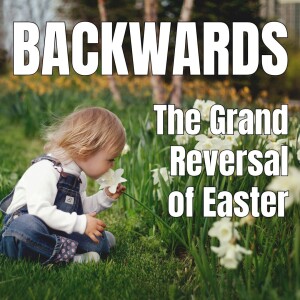
Wednesday Apr 16, 2025
Backwards - The Grand Reversal of Easter
Wednesday Apr 16, 2025
Wednesday Apr 16, 2025
Backwards - The Grand Reversal of Easter
By Craig D. Lounsbrough
I am backwards. I don’t think I’m backwards, I wouldn’t necessarily see myself as backwards, nor would I tell you that I’m backwards; but I’m backwards. And the oddity of it all is that I actually see backwards as forwards. From where I’m sitting it doesn’t look backwards at all. However, in terms of how I conceptualize the realities of life as held against the limitations that I perceive myself as having, I’m backwards.
I’m backwards because I have tediously assessed the realities of the existence within which I am forced to operate, and I have concurrently determined the permanently fixed limitations that define my humanity as I live within that existence. And based on the conclusions I have drawn in these two areas, I have done a rather splendid job of setting the parameters for my existence by configuring (to the best of my ability) what’s possible and what’s not.
In the end, this determination that I have made regarding that which is ‘possible’ verses that which is ’impossible’ is markedly canted toward the ‘impossible’, leaving me facing a life bereft of everything except a handful of the most limited ‘possibilities’. Worse yet, this determination has come to comprehensively define all of life as I know it, leaving me nothing bigger than myself. I have categorized the whole of life as falling within the limits that limit me, assuming these are limits for everything that exists, or ever will exist, or ever could exist. And in that sense, I have dramatically drawn down life into some minute rubric that is but the slightest fraction of what life really is. Indeed, I am backwards.
God’s Reversal
We reject God because He is not backwards. He comes to us asking us to move forward, which we, by virtue of our shallow determinations about how life works, see as backwards. And we stand there wondering why we would be asked to do something so utterly preposterous as moving backwards. In fact, what God calls forward we call impossible, or improbable, or ridiculous, or naïve, or fanciful, or ignorant, or any number of other explanations that really do more to explain how backwards we really are.
Reversals
History is littered with God’s reversals. Leprosy was healed when the person should have been consumed by it and died. Bodies of water were split in two when they should have been completely impassible. Food to feed literal thousands was secured from nothing more than a few small fish and a handful of leftover loaves of bread. Massive armies were evaporated without so much as a shot being fired. Dead teenagers were raised to life instead of being dropped in a hole. Paralytic limbs were straightened and people walked away when they should have crawled away. That stuff is all backwards.
The Grand Reversal of Easter
Then there is the grand reversal of Easter. It began with an execution reversed, whereby He who was innocent was brutally executed by those who were guilty. It was an inhumane execution turned into ingenious sacrifice, whereby an end for one man turned into a beginning for all men. It was a devout religious leader who should have cast his vote against this man, who instead carried this man’s body into his own tomb. Three days later it was an empty tomb when it should have not have been, leaving a dead man walking which is a reversal of the most astounding sort. It was a group of terrified disciples keeping their heads down while crawling back to their old lives, now standing directly in front of the man they watched lose His. It was all backwards.
These were all uncategorically opposite of what should have been. If we apply the realities of the existence within which each of us are forced to live, these things and so many more were and are completely backwards. They were completely opposite of how it all should work. They simply did not and do not fit into how we have conceptualized the realities of the existence within which we are forced to operate, and how we have concurrently determined the permanently fixed limitations that define our humanity. They are backwards.
Going Forward
To fix this conundrum, might we say that to go forward we must indeed be willing to go backwards. And I suppose the best way to do that is to switch the two of these in our minds by reversing our perception of how this existence actually operates. And we cannot do that unless we include God, for God is the single and sole thing that reverses the limits of our humanity by quite literally obliterating those limits with His limitlessness. Therefore, we must comprehensively trade who we are for what He is, and in the trading trade off everything of us in the exchange.
We must understand that it is not our limits that define our existence at all, although we have foolishly surrendered to that terribly myopic idea. Rather, it is God’s power and nature that define it. We must understand or at least accept the immense, radical and in many cases incomprehensible difference between who we are and who God is. And out of that understanding we must willingly trade our limitations for God’s limitlessness. Indeed, that alone will abruptly turn things around.
When we do that, backward becomes forward. And when that happens we will have cut the chains that we’ve slapped on life, we will have blown out the boundaries that we thought defined us, the ‘possible’ verses that which is ’impossible’ now becomes wholly canted toward the ‘possible’, and the horizons that we had tightly fixed on our lives suddenly blow out to horizons that are horizon-less.
Standing in the gaping space now created, we suddenly start to understand that dreams are more than hopeful fantasies that our minds toy with, rather they become realities that life is changed with. That a vision for something better can move from ‘nice idea’ to ‘transforming ideal’. That hope is not some thin thing that is subject to the winds of fate, but it is crafted hard by the hands of God. That the end of ourselves is where God begins. That the fear of failure is slain cold by success already hot on the way. That a looming mountain is nothing more than a road in disguise, and that the impossible is not an obstacle but an invitation.
Message Delivered
All of this and more happens when we refuse to continue to go backwards. All of this and more is the true forward. This is the incessant and unrelenting message of God throughout history. And it is a message hand delivered by God’s Son Jesus with potent impact at Easter. It is a message for anyone who will hear it. It is the single and sole message that can turn us from backward to forward. Therefore, be assured that the direction of our lives and the outcome of our existence will hinge on what we do with this single message. Oh yes, I am backwards, but no longer. How about you?
Find additional Easter resources on our website at www.craiglpc.com.
Enjoy all of our daily posts on Facebook, Pinterest, LinkedIn, X, and Instagram.
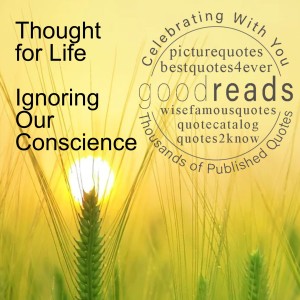
Saturday Apr 12, 2025
”LifeTalk’s” Thought for Life - Ignoring Our Conscience
Saturday Apr 12, 2025
Saturday Apr 12, 2025
LifeTalk's "Thought for Life" is a weekly one-minute thought that touches on one of today's pressing issues. Each of these brief presentations is centered on one of Craig's personal quotes. All of his quotes are specifically written to challenge, inform, and inspire. Today's thought is:
“Disabling your conscience is like disabling your smoke detector. It doesn’t stop a fire. It just leaves you ignorant of the fact that there is one.”
Follow all of Craig's daily quotes on Facebook, Pinterest, Twitter, Linkedin and Instagram.
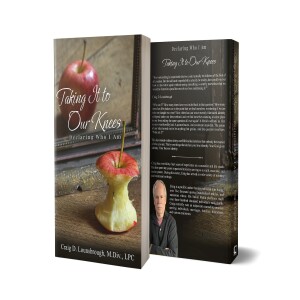
Wednesday Apr 09, 2025
Defined By the Culture - "Taking It to Our Knees"
Wednesday Apr 09, 2025
Wednesday Apr 09, 2025
Defined By the Culture
"Taking It to Our Knees - Declaring Who I Am
“When they ridicule me and tell me that my need to do the ‘right thing’ is embedded in an overweening insecurity about doing the ‘wrong thing,’ I quickly inform them of three things. First, I inform them that it is nothing of a need born of fear, but everything of a choice born of conviction. Second, that it is nothing of insecurity, but it is everything of a strength that is sturdy and amply sufficient to field the most caustic of criticisms cast against it. And third, that this strength is far more potent than the pathetic weakness out of which their criticisms arise.”
- Craig D. Lounsbrough
Rubrics and More Rubrics
The culture is full of rubrics. Really cheaply crafted rubrics. These rubrics are defined by what’s loosely determined to be vogue, trendy, politically correct, in lock-step with progressive thought, and anointed by whoever’s doing the anointing at any particular time. These rubrics are always shifting, ill-defined, and possess a shelf-life that’s about as short as the attention span of those who dreamt them up.
These rubrics are typically granted a sense of rightness and correctness without any evaluation as to either. They’re viewed as defining the current state of societal evolution as it supposedly trends toward a more enlightened society.
These rubrics become the template by which groups and individuals are evaluated as to whether they are cooperating with this progressive evolution or whether they are not. If it’s determined that they are not, they are assigned any number of derogatory labels. These are typically categorized into a variety of negative stereotypes that are held as defining the persons that they’re labeling.
The Cost of Not Fitting In
Therefore, the cost of not ‘fitting in’ becomes incrementally greater the more that we deviate from the vogue, trendy, politically correct, progressive thought that’s forced upon us. The greater our divergence the greater the cost.
This creates a dilemma of identity. Do we borrow the ever-shifting identity of the culture, or do we press the culture aside sufficiently enough to determine who we are as a unique individual existing within the larger culture? Do we allow any of the elements within our culture tell us who we are, such as our families, our communities, our jobs, the accepted cultural mantras, or the organizations to which we belong?
The demand for adherence is incessant, pressing, and coercive. The culture struggles knowing what to do with people who refuse to embrace the cultural narrative. It doesn’t mesh well, or it’s considered blatantly adversarial. It’s messy and irritating to those who are incessantly beating the drums of lesser cultural agendas. Therefore, the pressure to conform is intense. The more that we reject what our culture demands that we be, the more alienation we experience. We are subjected to punitive measures and pressed further and further outside the mainstream culture.
Who Will We Choose to Be?
The culture can’t define you. It doesn’t have that kind of power and it certainly doesn’t possess any such privilege. People and organizations and the larger culture can say any number of things about you. They can criticize you, make declarations about you, label you in any number of ways, or stereotype you in order to force-fit you into their agendas or force-fit you right out of the culture.
Yet, you are none of these things. Criticisms, declarations, labels, and stereotypes are far too small to express the fullness of your humanity. These are weak definitions of something far too big to define. Yet if we bend to them, they leave us living out a pasty-thin identity that is a horrific exploitation of who we actually are.
Who We Are
No element of our culture can define you. No culture possesses the capacity to do that. No part of the culture has the depth to define the depth within us. The culture doesn’t define us because it can’t. The fact is, it can’t even define itself.
We are defined by something far greater than the culture. Something that outlasts and outlives any culture. We are defined by the God Who created us. Nothing can define us except that which determined what our definition was to be. Nothing else understands the whole of us except that which created the whole of us. Nothing else understands the intricacies, the nuances, and the ingenuity of a design that lays leagues beyond the intellect of any man or collection of men.
Breaking Away
The culture has made many demands of us. Many messages have been sent to us. Many characterizations have been made. Labels have been assigned. Definitions have been plastered all over us. Traits ascribed and values determined. And all of this will continue.
Yet, none of these define you. None of them can. None of them ever had. Therefore, don’t grant them power to do what they cannot. Yet, over time we have carried these definitions. And as we have carried them we begin to act on them. When we act on some belief we are likely to get results that mirror the belief upon which we acted. Therefore, if we act on the things that the culture has defined us as being, the results are likely to confirm that we are those things.
Thirty-One Things God Says You Are
Yet, you are none of these. You can’t be. You won’t be. And you can’t be because you are far too vast to be fully defined by any one of them or any assorted collection of them. Only God can define who you are. He’s got the blueprint. The only thing that the culture’s got is a few errant scribbles on an illegible scrap of paper that they can’t find half the time. Only God knows you from the best of yourself to the worst of yourself. And this God is calling you to your authentic self.
Taking It to Our Knees
You will find thirty-one of God’s “I Am” statements outlined in my book, “Taking It to Our Knees – Declaring Who I Am.” This book is a fresh, entirely thought-provoking, and richly insightful thirty-one day devotional that will assist you in both discovering and living out your real self. You will find “Taking It to Our Knees – Declaring Who I Am” on Amazon, Barnes and Noble, or wherever books are sold.
Thanks for joining us on LifeTalk today. You will find LifeTalk on most podcast platforms as well as YouTube. I would also encourage you to check out our daily posts on all of our Social Media sites.
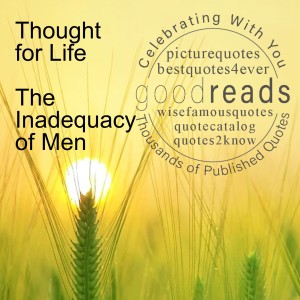
Wednesday Apr 09, 2025
”LifeTalk’s” Thought for Life - The Inadequacy of Men
Wednesday Apr 09, 2025
Wednesday Apr 09, 2025
LifeTalk's "Thought for Life" is a weekly one-minute thought that touches on one of today's pressing issues. Each of these brief presentations is centered on one of Craig's personal quotes. All of his quotes are specifically written to challenge, inform, and inspire. Today's thought is:
“I am left with no alternative than to look beyond the efforts of men, for efforts of those sort leave cities flattened, nations teetering, and lives crushed. Instead, I must shift the whole of my gaze to the God who tenderly kneels in the midst of this unimaginable carnage and effortlessly makes the healing imaginable.”
Follow all of Craig's daily quotes on Facebook, Pinterest, Twitter, Linkedin and Instagram.
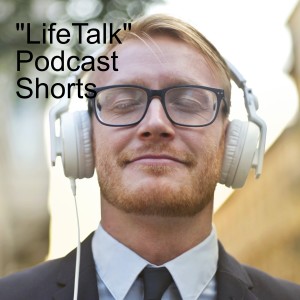
Monday Apr 07, 2025
I Heard a Robin - Hope in the Dark
Monday Apr 07, 2025
Monday Apr 07, 2025
I Heard a Robin - Hope in the Dark
We all create expectations. But how often are our expectations a wholesale surrendering of ‘what could be’ to ‘what is?’ How often are they borne of a discouraged soul and a frightened heart that cannot see beyond the realities of the moment so as to envision a brighter reality standing at-the-ready in the next moment? How many times have we taken the darkness of today and handily projected it onto the landscape of a tomorrow that is in fact full of light? How many times have we expected that failure will be our lot, disappointment our bedfellow, and that this curse is somehow our due? We create expectations because that’s what we do, so we’d better be very careful as to how we create them.
What Shapes Our Expectations
There are an innumerable array of elements that mold and craft our expectations. However, there are several that seem to directly impact most, if not all of the rest. In and of themselves, these three are certain to kill our vision and utterly convince us that tomorrow will surely embody the darkness of today. Left unchecked to bleed into the other areas of our lives, they can leave us destitute.
First, we have a tendency to focus on the negative experiences that we have had for fear that the positive ones weren’t authentic, or if perchance they were, they’re unlikely to come our way again. Second, we build a faith that’s safe, which means that it’s ‘faith’ in name only and therefore it holds no power. Third, our vision is limited by the walls that we’ve meticulously constructed all around ourselves in order to protect us against imaginary enemies, or at least enemies that are not nearly as gigantic as we’ve given them permission to become. And while it’s obvious that far more goes into the creation of our expectations than these three ingredients alone, these would appear to be inordinately impacting.
Making ‘What Is,’ ‘What Will Be’
Because these appear to be an inherent part of us, we gather up the sum total of our negative experiences, we fall victim to them because the lackluster nature of our purported faith can do no other, and we hold them hostage to these incessantly compressing walls of ours. And in this ever-weary concoction of negativity, faithless faith and massive walls, everything coalesces to shape a distorted observation of ‘what is,’ which then goes on to shape these rather dark expectations of ‘what will be.’
Therefore, our expectations are constricted to what will ‘not’ happen verses being exuberantly expanded to embrace what actually might. We project the misery of the present onto the landscape of the future and render it such before we even get there to better ascertain what it might actually be. We live with this morbid expectation that nothing will get better, that the future is eternally doomed to be nothing more than the past in redress, and that any hope of something better would be yet another expectation disappointed when we feel far too fragile to bear yet another disappointment of any sort at all.
Hope Deferred
The morning was yet dark as if the darkness was purposefully lingering in spite of a morning that should have long been well on its way. The cold of a winter in retreat somehow remained fiercely undiminished, casting a biting edge across what was supposed to be a warming spring. The snow had secretly begun falling under the cover of a night now lifting, leaving a world elated by spring’s flowers laying helplessly encased in winter’s white. It was as if the coming of spring was a promise disappointed; a hope fallen prey to a winter that spring was supposed to be advancing against. That days tenderly warmed at the edges with hints of green breathing new life into winter’s impossible cold were a hope ripped away.
Sometimes we let circumstances of the moment create our expectations of the future. We altogether lose the vision of being able to see beyond what besets us at the moment. What we see is the ‘what is’ that our minds have interpreted as ‘what will be.’ And we throw the ‘what could be’ of a future yet unwritten into the straitjacket of a ‘what is’ that has all but consumed us. The ‘now’ is projected forward and the future is subsequently cast in its unforgiving mold. We create the shackles that bind us to the present and we fashion the blindfold that keeps us from seeing the future as anything but the present. Our expectations of ‘what will be’ are crafted entirely by ‘what is,’ and yet it is highly likely that neither are correct.
I Heard a Robin
Suddenly and without warning, out of snow and darkness I heard a robin. I heard the harbinger of spring call out into the dead of winter. I heard a single song that raised itself up against the dark and the cold and the anger of a winter being forced into retreat. It sat entirely at odds with everything that made that morning that morning, this bold song of this single bird off in the distant distance. As held against the power of the frigid morning, it seemed to be voice mocked by the morning itself. It seemed a lone prophet of spring that was ridiculed for bringing a such a song into such a morning. But it sang anyway. It sang until the sun rose. It sang the promise of something better that I could not see because I had errantly projected the ‘what is’ of a dark moment onto the ‘what could be’ of a spring already surging in my direction. This single robin was not deterred by the darkness and foreboding cold of my expectations. It sang. And that evening, it bid the cold day farewell by singing into the night of spring well on the way.
Expectations
It took a robin, this single harbinger of spring to remind me that the moment is just that…the moment. On the heels of any day or any event there is a robin singing in the distance. There is the hope of something coming, of the end of the darkness and the cold, of all things always moving on to new things. I cannot allow my expectations of ‘what is’ to create some sort of construed view of a future that in and of itself will not bow to my ‘what is’.
It might be dark. It might be cold. I might not see the horizon. But out on the horizon’s edge there stands a robin. There is something that is raising its song into the darkness and the cold, heralding the truth that something new has long been running in our direction. Such is the story of spring, and better yet, such is the promise of God’s redemptive plan. Something new is coming and the darkness of our expectations cannot stop it. It’s existence is undeniable and its arrival is inevitable. So you might take a moment, step into a darkness that is cowering before the light of a new day, pull your coat tight against a cold that is bowing in sure retreat, raise an ear and listen for a robin.
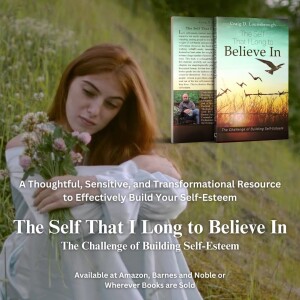
Friday Apr 04, 2025
I Am Only One - "The Self That I Long to Believe In"
Friday Apr 04, 2025
Friday Apr 04, 2025
LifeTalk Script
I Am Only ‘One’
Understanding Our Impact
“I am only one but still I am one. I cannot do everything, but still I can do something.”
- Edward Everett
I am only one. That’s all I am. I am only one and I will always be only one. I was born as one, I will live as one, and on the day of my death I will die as one.
Living as Being Only One
And so, because I am only one, I relegate myself to being only one. I surrender to this weak singularity. I am obscure, so much so that I can hardly define myself or my purpose as held against the billions of others within which my existence becomes swallowed up and lost. As held against history, time and creation, I will enter with barely a sound and I will exit in the same manner.
And in relegating myself to being one and only one, I unwittingly embrace the limitations that I perceive are part and parcel of being one and only one. I become convinced of what I think being one means and subsequently what it does not mean.
The Fears of Being “One”
The Fear of Not Being Enough
I think that we fear that being one is not being enough. Being one is too often seen as being inadequate. The world out there is not some massive mass of people. It is a collection of individuals. It’s a bunch of ‘ones.’ By and large, those individuals experience life pretty much the same way that we do. It’s all just a collection of ‘ones.’ It’s a collection of people that are each one individual just like we are one person. While being one makes us perfectly suited to impact all the other ones around us, we still fear that being one is not enough.
The Fear that We Can’t be Loud Enough
I also think that we fear that our single voice is not loud enough. We don’t have the volume to be heard over the raucous, roar and interminable noise in our world. We can’t possibly scream loud enough or long enough to be heard in the ruckus and racket that defines the world around us. So our voices are drowned out. Yet, we need to remember that we’re not speaking to the world around us. We’re speaking to the ones around us. And because that’s the case, there’s plenty of them and we’re plenty loud enough.
The Fear of Being Rejected
I think that maybe our greatest fear is that we will be heard, and that in being heard we’ll be rejected or discounted or blown-off. It seems that our single biggest fear is rejection. What if we’re heard and in the hearing we’re labeled as stupid, naïve or ignorant? What if we’re heard and then we’re slapped with accusations of being politically incorrect, culturally ill-informed, biased, mistaken at some fundamental level, or being something of a faith-based moron? What if we take a stand? What if we refuse to compromise? What if what we’re saying isn’t popular or trendy or it’s absent in the talking points of a screaming media? What if? I think that we need to understand that there are ‘ones’ out there who share our convictions and who understand the oppressive burdens that birthed those convictions. Indeed, we are ‘one’ but we are not alone in being ‘one.’
The Fear of Failure
What if I step out as one in the midst of the chaos and the darkness and the malaise, and what if I fail? What if nothing is different? What if I am shamed into submission as my failures bring me face-to-face with the limitations of being only ‘one’ that I hoped were not true? What if I try and nothing changes? What if I step up and get knocked down? Then through some misplaced hope and fanciful zeal I have done nothing other than convince myself that being only ‘one’ is truly limited to being only ‘one.’ And I hardly think that I could live with that.
The Fear of Responsibility
But what if this one that I am is not a one in isolation? What if I can change things? What if I can impact the world? What if? Maybe we don’t want to be responsible for that much power. Maybe we don’t want to shoulder some sort of bold mantel, draw our resources around us, and press out against so much of what is destroying so many. Maybe under the right circumstances we’d be willing to following someone who would be willing to do that, but we don’t want to be the one doing that. We prefer to leave such exploits to others and follow them at a comfortable distance, or track them from an even greater distance. But, what if we actually pull it off and are left with the responsibility of having done that? The responsibility might be a bit too much for us.
The Opportunity of Being “One”
I am only one in a mammoth sea of humanity within which my main and often single goal is simply to survive. But I am one, and my oneness is sufficient to forgo surviving and embrace living. I am only one and despite the rather lackluster view of myself, being one is enough.
I am only one, and because I am, the reality of my existence can change the reality of everyone around me. In the span of this minute, or this hour, or this day, or in the span of history itself my existence ‘can’ be noted, and because I am one it can register enough to acknowledge that I was here. The briefest notations that I have made or will make on the pages of history can add moving lines of inspiration in the seemingly infinite volumes of tightly written copy that stretch from mankind’s earliest moments to his eventual demise because I am one.
I am in union with the Infinite ‘One’ Who renders me capable of being everything that I am not. I have yet to understand that my oneness is never held solely to itself. That my oneness is the seed of a greater greatness that when joined with God, with those others He brings alongside of me, with the dreams He has implanted within me, with the purpose He has bestowed upon me; this ‘one’ will remain one, but it will be a one that has moved leagues beyond its own oneness. Yes, I am only one, but I am one in league with a God Who makes my oneness infinite.
You have one chance at being ‘one.’ You have been granted one life to touch the other ‘ones’ around you. Being one is being enough. Life’s about being intentional about being the best ‘one’ that you can be, and intentionally touching all the other ones around you in a manner that transforms them ‘one’ at a time. Be the one that you were designed to be and change the world by being that one, for despite your poor assessment of yourself you will always remain this beautiful one.
Closing
Today’s podcast is drawn from the book, “The Self That I Long to Believe In – The Challenge of Building Self-Esteem.” Get your copy today at Amazon, Barnes and Noble, or wherever books are sold.
Thanks for joining us on LifeTalk today. You will find LifeTalk on most podcast platforms as well as YouTube. I would also encourage you to check out our daily posts on all of our Social Media sites.
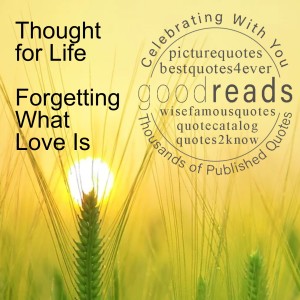
Wednesday Apr 02, 2025
”LifeTalk’s” Thought for Life - Forgetting What Love Is
Wednesday Apr 02, 2025
Wednesday Apr 02, 2025
LifeTalk's "Thought for Life" is a weekly one-minute thought that touches on one of today's pressing issues. Each of these brief presentations is centered on one of Craig's personal quotes. All of his quotes are specifically written to challenge, inform, and inspire. Today's thought is:
“Love is the essence of our humanity expressing itself in actions of sacrifice so profound that we risk not surviving those expressions.”
Follow all of Craig's daily quotes on Facebook, Pinterest, Twitter, Linkedin and Instagram.
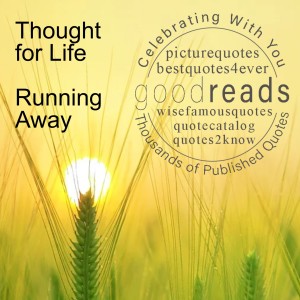
Monday Mar 31, 2025
”LifeTalk’s” Thought for Life - Running Away
Monday Mar 31, 2025
Monday Mar 31, 2025
LifeTalk's "Thought for Life" is a weekly one-minute thought that touches on one of today's pressing issues. Each of these brief presentations is centered on one of Craig's personal quotes. All of his quotes are specifically written to challenge, inform, and inspire. Today's thought is:
“Running from what we fear is like throwing a bunch of stuff in the bed of a truck and somehow thinking that driving the truck will distance us from what’s laying in the bed.”
Follow all of Craig's daily quotes on Facebook, Pinterest, Twitter, Linkedin and Instagram.
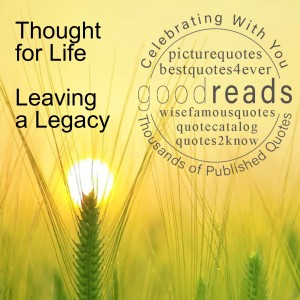
Friday Mar 28, 2025
LifeTalk’s ”Thought for Life” - Leaving a Legacy
Friday Mar 28, 2025
Friday Mar 28, 2025
LifeTalk's "Thought for Life" is a weekly one-minute thought that touches on one of today's pressing issues. Each of these brief presentations is centered on one of Craig's personal quotes. All of his quotes are specifically written to challenge, inform, and inspire. Today's thought is:
“Who are you sending into the future and how are you sending them? For this is the stuff of legacy that we tend to forget until long after we’ve sent them.”
Follow all of Craig's daily quotes on Facebook, Pinterest, Twitter, Linkedin and Instagram.
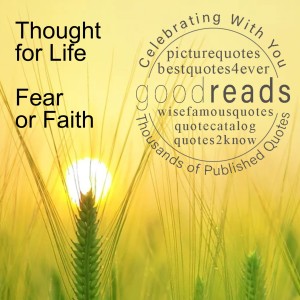
Monday Mar 24, 2025
”LifeTalk’s” Thought for Life - Fear or Faith
Monday Mar 24, 2025
Monday Mar 24, 2025
LifeTalk's "Thought for Life" is a weekly one-minute thought that touches on one of today's pressing issues. Each of these brief presentations is centered on one of Craig's personal quotes. All of his quotes are specifically written to challenge, inform, and inspire. Today's thought is:
“It comes down to 'fear' and 'faith'. 'Fear' of what stands in front of me. 'Faith' in believing that the resources I possess can handle what stands in front of me. If I stop at the former, I will change nothing. If I embrace the latter, I can change everything.”
Follow all of Craig's daily quotes on Facebook, Pinterest, Twitter, Linkedin and Instagram.

Saturday Mar 22, 2025
Saturday Mar 22, 2025
Slavery as an institution is pretty far removed from the minds of most of us residing here in 21st century America. Slavery sits back plenty far enough in the faded, yellowed and brittle pages of history to create a more than comfortable chasm between us and itself. We view that chasm of time and social development and modernism as broad enough to keep slavery from leaping from the past across the chasm of time into the present. The idea of slavery seems to evoke dusty black and white tin-type images of the Civil War, the expansive plantations of the Deep South, bloodied chains, inhuman whippings, lynching’s, and wild-eyed slaves fleeing through swamps, thick underbrush and the wilderness of their own fear.
Those kinds of pictures have become our definition of slavery; the visual that creates a picture of what slavery is. Slavery is seen as a physical captivity that coerces a forced service to an enslaving master. That’s how we view it. That definition is nearly exclusive, making our definition of slavery so incredibly tight that we can’t see any other kind of slavery at all. And if we don’t see slavery of this type, we assume freedom. That assumption in and of itself can be enslaving.
Slavery to Ignorance
Martin Luther King, Jr. wrote, “Nothing in all the world is more dangerous than sincere ignorance and conscientious stupidity.” Ignorance is being oblivious, to one degree or another, to the obvious. Confucius said that “ignorance is the night of the mind, but a night without moon and star.” Ignorance is walking around in the dark without realizing what ‘dark’ is, and having no understanding of light.
It’s not seeing what actually ‘is,’ to the point that whatever it ‘is’ that ‘is,’ isn’t . . . at all. It’s having no recognition of something that exists despite how very real and very powerful that thing might be. Ignorance is naiveté multiplied to blindness. It seems that living in blindness can be freeing in some cases, and horrifically dangerous in others.
The old adage that “ignorance is bliss” is blissfully ignorant of how much damage we can experience walking in that kind dark darkness. Despite all of that, the worst kind of ignorance is when we’re ignorant that we’re ignorant. It’s one thing to intentionally ignore something and turn a blind eye. It’s quite another thing to be so ignorant that we don’t even know that anything’s there to turn a blind eye to. Ignorance at its fullest is fully convincing. It sells us wholesale on the hypnotically appealing belief that there’s nothing to be ignorant about because there’s nothing out there to be ignorant about. We buy the whole sales job lock, stock and barrel because it’s what we want to believe regardless of whether it’s really believable or not. At that point slavery leaps out of tin-types and right into our worlds.
Ignorance can open the doors to a lot of things and give a whole lot of space for a whole lot of things to exist in our lives. Yet I think that ignorance of our enslavement is one of the worst types of all of the kinds of slavery that we can be shackled to. To be ignorant and to be enslaved at the same time seems to be the absolute worst kind of slavery since we don’t even know that we’re enslaved. We become ignorant to slavery and slaves to ignorance.
What Enslaves Us?
How many things enslave us? We tend to see that things demands things of us, that we struggle with certain behaviors or attitudes, that we have our holes to dig ourselves out of, and our mountains to climb over. We look at our lives and see what we need to change, what should be altered, where we need the proverbial “nip n’ tuck,” a bit of “cut and paste,” or maybe a little bit of Botox for the personality. We likewise see the pieces of ourselves that need to be entirely eliminated in some sort of wholesale, demolition-like fashion.
We see our foibles, the fallacies of false fronts, our warts and things that warrant our attention. We know that we’re not where we should be and that where we should be isn’t anywhere along the road of where we’ve been going. We know at times that our values have been compromised, our integrity has been marred, and that far too often our morality has had the air completely sucked out of it. We realize that we’ve crafted career strategies that have outright killed our marriages, and that we’ve sacrificed families to seize six figure incomes. We know that we haven’t been accountable when we should have been, we haven’t apologized when we should have, and that we’ve never restored even half of what we’ve stolen along the road of our lives. We know.
Ignorance in Action
Yet, we tuck these things in the deep file of ignorance and then we file it away in the filing cabinet of forgetfulness. Once we do that, we make every effort never to pull the file ever again. Yet, nothing is filed and no filing cabinet exists despite the ingeniously creative wealth of our imaginations to believe it to be so. In reality we walk with all of this stuff hanging on with claws embedded in our hearts, and roots thickly entwining our souls. Yet we ignore this. We skip and cavort through life to some sort of fabricated tune whose velvety verses sooth us with lyrics that all is good and our lives are squeaky clean and polished to a mirrored surface.
Or we manipulate ourselves into believing that whatever good that we have is good enough. That life is more about the business of survival which doesn’t afford us the larger luxury of introspection, personal evaluation and the sweaty rigor of change. We don’t see anyone else focusing on all that negative stuff and so we assume that it must not be all that bad or everyone else would be focusing on it . . . wouldn’t they? We find some comfort in the belief that overall we’re good people and at least we try to do the good thing even if we don’t end up doing the good thing.
We create expansive and ornate rationalizations to justify ignorance, and we do a bang up job of creating them. Once we create them we nail them to the walls of our conscience so that we have them for ready reference during the times when guilt handily rankles our souls. We lull ourselves into belief that in the end, all of that stuff really doesn’t matter all that much anyway and that it will sort of eventually fall off behind us and kind of blow off the road of our lives, somehow getting lost somewhere in the wilderness of our journey . . . so we think. Therefore, we settle in ignorance and let ignorance give all of these things space to enslave us.
Our Enslavement
We are a peculiar people indeed. We tend to focus on the tasks that will either achieve our goals or keep our heads above water, whatever our situation might be. We’re notorious for feeding, watering and carefully attending to all the superficial stuff, but we put the real stuff out of sight behind the impermeable veil of ignorance. And we live as slaves to that stuff.
We work to tactfully or not so tactfully counter the real stuff and we futilely attempt to offset it by managing and manipulating the superficial things and focusing on the things that don’t hit us too hard or upset us all too much. Yet all of our efforts to offset all of the things stored deep in catacombs of ignorance are wholly insufficient. We live trying to change things by ignoring them. We attempt to resolve them by countering them with something else that isn’t as difficult or problematic to deal with. Or we justify them with conveniently trite sayings or offbeat philosophies that act like cooling waters on the searing hot coals of our conscience. In all of this maneuvering, we try to cheat ourselves to health and wholeness.
The end result is slavery to those things we’re chosen to ignore. They drive us to futility attempting to compensate for them by ignoring them. They pound and thunder and bend us from behind the veil of ignorance. They dog our steps and flog our minds. They draw us down and drag us out. They impale us as they impact us. In short, we become subject to them whether we wish to acknowledge its happening or not. We become so enslaved by our own foolish and short-sighted vision that we become ignorant to that which enslaves us. When that happens, we become slaves in the most awful manner possible.
Refute and Refuse Ignorance
We refute and refuse ignorance by being honest about our weaknesses and failures. We need to cast off justification and we to torch rationalization. We need to frankly acknowledge and bring to the forefront all of those things in our lives that we’ve chosen to ignore. Once we do that, we work to work through them with diligence and beat them by resolving them. In that way our enslavement can truly end because that which enslaved us is that which we’ve enslaved through its elimination.

Thursday Mar 20, 2025
”Flecks of Gold On a Path of Stone - Simple Truth’s for Profound Living” - Part Two
Thursday Mar 20, 2025
Thursday Mar 20, 2025
Flecks of Gold On a Path of Stone - Simple Truth's For Profound Living
An unknown author wrote, “Real treasure lies not in what that can be seen, but what cannot be seen.” Oddly, we possess this strangely cockeyed perception that we must be able to see something in order to treasure it. What we see as treasure is really only the thing that’s revealing the treasure itself. The treasure in a daisy is not the daisy, but the massively creative genius behind the daisy. The flower itself is simply a tender, fragrant and quite intricate manifestation of the real treasure. Reflected in the wonder of this simple flower we are privileged to see a whisper thin slice of something truly marvelous. Real treasure then lies nestled in hidden places with generous clues to its magnificence scattered all about us like a generous field of daisies that rolls off to blue horizons. Sadly, we call those clues “treasure.”
The real treasure is often too airy and intangible for us. But, we feel that we have to see treasure, which in reality keeps us from seeing treasure. Not only do we have to see treasure, we think that we have to be able to somehow hold it in our hands. And then, in far too many cases we think we have to be able to own in order to really treasure it. What we haven’t figured out is that if we can possess something it’s simply not a treasure, for real treasure is far too elusive to be held in the hands of any man.
Sadly, we rarely consider the reality that real treasure is the stuff that can’t be seen. Therefore, we don’t look for it because we presume that there’s nothing to look for. Because we don’t look for it, we miss real treasure and we accept the bogus, phony and plastic stuff of life for the stuff of treasure. We plod through life with our pockets crammed with a squalid array of worthless trinkets that we think to be treasure. We live anemically impoverished lives and we don’t even know it.
In fact, it may well be that to treasure something in a truly treasured manner it must be entirely ethereal; it must be something that we can’t see, that we can’t hold and that we can’t own. When we possess something, the fact that we have the ability to possess it suggests that whatever it is, it’s terribly limited; so limited in fact that we can control it. Possessing something suggests that whatever we possess is subject to our whims and the flux of our own whimsy. Anything we can control must have some sort of inferior status that automatically excludes it as being treasure of the most treasured sort.
Being unable to possess something suggests that it has a sweeping scope, an unfathomable significance, and a fathomless depth that is far beyond us or beyond anyone else for that matter. Real treasures are elusive because if they’re not, they don’t rise sufficiently above our sordid and stained humanity to be genuinely categorized as treasures. Real treasure will not be owned, or bound, or appraised, or hemmed in, or leashed, or locked in a vault, or confined to a trust, or be made subject to either our ridicule or praise. Real treasure is priceless because it supersedes and completely eclipses any rogue monetary standards that we’d foolishly attempt to place on it. Real treasure will not bow in servitude or obediently follow at our heels because it is superior to us. Yet the real wonder of real treasure is that it is withheld from no one.
Sparrows and a Clapboard Garage
Every spring the sparrows came back to the old garage; something like coming back to a comfy, old friend. Darting and bouncing in feathered frenzy, they would burst from the muscular maples and the tangled brush of the Mock Oranges, flirting and flitting in front of the garage in some sort of grand hello after a winter’s separation. Upon their return their boundless energy and contagious enthusiasm seemed wildly intoxicating; vibrant, vibrating and filled with all the fresh energy of spring. I often wondered if they had spent the cold, gray months of winter in a nearly uncontrollable anticipation of greeting their old friend once winter had rolled off the horizon of spring.
Sometimes in life there seems to be a subtle yet wonderfully warm camaraderie of sorts that develops between things you’d never think would or could be connected like that. Those things are a kind of treasure in themselves. That seemed to explain the quiet, entirely unspoken kind of relationship that existed between the old garage and the sparrows. They seemed like long seasoned friends that didn’t need to say much because the bond that they shared spoke more than words ever could. The old clapboard garage and the house sparrows were each warmed, gently magnified, and beautifully enhanced by the other. Each was a treasure embraced as a treasure.
The sparrows would glide up between the heavy wooden doors and slip by the sturdy steel tracks that they ran on; seeming to nestle into the garages soft, clapboard embrace. Every spring the sparrows would settle in and nest right above the heavy wooden doors, tucked just inside the thin edge of the garage attic. There was far too much love and warmth in the old garage, so there were usually two or three nests enfolded above the wooden doors.
It was easy to see the sparrows incessantly coming and going as they bobbed and darted about. Yet, as with any real treasure you couldn’t see what they were doing. Treasure enveloped in secrecy always lends a bit of tantalizing mystery to it all. The sparrows were phenomenally tireless; transporting endless bits of straw and brown grasses into the garage; building a place to birth the treasures of the next generation. Within moments of entering the garage they would poke out elated heads, and then burst into flight with empty beaks. In no time they would return with more strands of lacey grass, or bits of tattered weed, or cottony fibers, or limply discarded pieces of string . . . over and over.
Within weeks the sound of new life could be heard tentatively reaching out from above the old, wooden doors. Scattered chirps and peeps liberally tossed out as brilliant shards of spring would be shushed when anyone approached. Patient mothers were teaching their little ones that life is an incomparable treasure, but treasure does not eliminate danger. These little, hidden treasures would become ever louder as they grew. They would grow strong and eventually seek the independence of flight. Before the close of spring they would launch themselves in a gangly and awkward kind of flight. Curiosity would beckon them out to explore the places close to the garage, bursting into uncoordinated flight but never wandering too far way. Life would eventually call them out ever further from the clapboard garage until they were gone into summer’s embrace.
Characteristics of Treasures
Unobtrusive
Treasures are hidden away in quiet places. They speak in soft tones and often become silenced as we approach. They don’t beg to be found, but embrace us if we do happen to find them. They are the product of completely ordinary circumstances unfolding in wonderfully extraordinary ways. They are found hidden in the nooks and crannies of our existence; all around us if we quit allowing our attention to be captivated by that which is noisy and listen for that which is quiet and still.
The Product of Unexpected and Loving Camaraderie
Treasures are a product of treasures. Real treasure is the product of lives shared, experiences intermingled, roads merged into single lanes, sacrifices jointly experienced, the soulful laughter of two hearts in beat with each other, and lives bountifully expended in unity. Treasures are the step-child of lives lived out in shared experiences that dramatically multiply both the experience and persons in a manner geometrically beyond anything the persons could hope to experience alone. Treasures rise out of the relationship of people who are intimately woven together by the threads of time and the needle of experience.
Always Creating and Never Preserving
Treasures are not stagnant. They’re not to be preserved as in the preserving they will most certainly wither and they will perish. Real treasures begat other treasures. Real treasures are designed to perpetuate other treasures. Sometimes the perpetuation involves the replication of the original treasure, and sometimes the replication is something entirely different but just as wonderful. Treasures are ingenuously and deliberately crafted to enrich the world. If one thing is for certain, they are not designed to be encased in the lifeless museums of our making, or the vaults we create to keep them to ourselves. It’s in their multiplication that the cold of life’s winters are forced off the edge of the calendar to make way for spring.
Sown to the World
It’s our natural inclination to preserve treasures; to corral them and box them and seal them tight. We assume that unless they’re preserved they’ll be lost, which is entirely contradictory. In fact, they are designed to be launched and thrown out to the horizons of each of our lives regardless of whatever the season is that we might be in. Authentic treasures permeate our world; they gain wings of their own and they disburse so that they might reproduce in other places and in other lives. The stuff of treasure is irrepressibly infectious and prudently wild; intent on providing enrichment whenever and wherever it can. We must work against our own inclinations and toss treasures out to the world around us.
It would be tremendously wise to rethink the concept of treasure in your own life. What you may be holding onto may not be treasure at all. In fact, if you’re “holding” onto it, it’s not.

Tuesday Mar 18, 2025
Tuesday Mar 18, 2025
Flecks of Gold on a Path of Stone – Simple Truth’s for Profound Living”
Someone once uttered the timeless saying that “timing is everything.” There’s something about things happening in a certain order in a certain time that makes it all fit in a certain way. We sense a natural and correct progression that, if followed, leads to success or happiness or fulfillment or whatever it is that we’re chasing. The whole element of timing seems critical. The more important something is, the greater the issue of timing seems to be. Timing can be so critical that at times we set out to minutely orchestrate the tiniest pieces and parts of whatever we’re doing so that everything is perfectly cinched, tightly in synch and precisely on time.
Falling Apart Just to Fall Apart
Yet sometimes it all falls apart anyway. I mean it disintegrates; something like Murphy’s Law times three or four. Sometimes it’s not just a matter of something being a bit out of step, or not lining up quite right. It’s not about tweaking something or gently nudging it back into whatever place it was supposed to be. Sometimes the wheels fall off the thing, which then causes everything else to fall off as well. We end up with the classic train wreck where we met a downhill train on an uphill grade. More than that however, there’s absolutely no rhyme or reason for the train wreck. It simply didn’t need to be, but it was. It was all way beyond any odds or all statistics. Whatever happened, it was a cruelly extenuated string of stupid, dumb luck.
Sometimes it just all falls apart . . . all of it. We’re left standing dumbfounded, mired in the confusion of it all and running our minds down a thousand roads of the classic “what could have gone wrong?” question. Sure, we’ll likely find some things that weren’t too well thought out or strategies that were a bit ill-conceived. We might unearth some rationales that now, in hindsight, weren’t quite as rational or shrewd as we originally thought them to be. We even might stumble over some misdirected motivations or less than ethical agendas that were part of the whole thing. The way we pasted it all together may have not been entirely seamless, and the stuff that we pasted together in the first place might have been less of a fit than we have originally thought. We may have even chosen to force fit some stuff that in the end really didn’t mesh all too well. Yeah, there are probably some quirks and a few flaws.
Yet, there are times when these quirks and flaws and other dynamics really represent only a small portion of the whole train wreck. We dig and scratch and scrape only to uncover a sparse handful of these dynamics. There are times when the sum total of them is far too small and far too innocuous to really explain why the wheels fell off and the whole thing fell apart. They don’t add up sufficiently to explain the mess that lays scattered, derelict, smoking and broken at our feet.
When Lack of Timing Makes Us Look Bad
George McGovern once said, “You know, sometimes, when they say you're ahead of your time, it's just a polite way of saying you have a real bad sense of timing.” Sometimes we just try to play it all off, or make light of it in order to make it lighter. We missed a step somewhere, or we lost our place in the script, or we missed our cue. We can make it all cute and cut up about it. We can poke fun at ourselves to lighten everything up a bit. We can make polite statements to take the edge off of our stupidity. But when we lose our timing and things go horribly wrong, there may be nothing remotely right that can be said.
No Answers
In the end we’re left with bushels of questions that rot for lack of answers. Things just didn’t line up. There’s no sustaining or compelling rationale other than it didn’t happen when and how it should have happened. If the timing had been good, it all would have all been good. But the timing was not and now everything lays wrecked and ravaged.
Sometimes the losses are marginal. At other times they’re catastrophic. Sometimes we can just pick up our toys, brush them off, head on home and play another day. Sometimes there’s nothing left to pick up other than the charred ash of incinerated dreams and the unidentifiable pieces of years’ worth of hope and sacrificial toil. Sometimes it’s no big deal, and at other times the whole thing is deal-breaker. Sometimes we can pick up and move on, and at other times there’s nothing to pick up and no place to move on to.
Better Questions to Ask
Maybe we should expand our thinking a bit. Maybe we should ask the question “is loss sometimes the best thing that can happen?” That’s a bitter and biting pill to swallow, on top of the fact that it’s a completely unsavory to even entertain in the first place. It suggests however that things in life don’t line up because maybe they’re not supposed to. Maybe what we were doing was in reality a whole lot more wrong than it was right. Maybe it would have been a whole lot more damaging than it would have been constructive. Maybe it would have been the thing that would have robbed us totally blind rather than enriching us beyond measure. Maybe it would have become the monster rather than the malevolent benefactor. Maybe the fact that wheels fell off of it and it derailed was one of the biggest blessings we’ve experienced in a very long time.
Is there room in our thinking to entertain the possibility that failure is sometimes preferred to success? Success does not always deliver a blessing and failure does not always deliver a curse. Life is far too vast to place success and failure into scrupulously neat and tidy categories that we aptly apply in each and every situation. Sometimes the best thing for us is the very thing that we feel is the worst thing. Sometimes in God’s grand scheme, pain and loss are the pavers to something grand and glorious. Sometimes a misstep is a nothing more and nothing less than a change of cadence to right a path right to God.
The Taxing Nature of Our Preconceived Outcomes
At the beginning, when we’ve started to head off into most of our endeavors we don’t have the perspective of what this will look like on the other end. All we see is what we have in front of us, how it all goes together, and then based on that how we guess it will all come out in the wash. We can take a shot at speculating outcomes and be pretty convinced that our conceptualization will indeed be what it will look like on the other side. We can do the math and project the numbers and point to what it should all add up to. We can play with our mental bell-curves and crunch the emotional numbers to calculate an outcome. But sometimes things don’t add up according to our calculations, despite how tedious they might be. Sometimes our best projections because our most haunting nightmares.
We’re typically not open to this kind of thinking because we’re angry about the loss and we’re licking our wounds because we feel gipped. We didn’t land where we projected we would land and we scour the minute fractions and infractions in order to get us to those ill-fated coordinates. We’re not in the mindset to think about the fact that maybe it blew up so that we wouldn’t. There’s no room in our heads to realize that we might have just been saved from ourselves. We’re too recklessly obstinate to realize that if we keep insistently goading the situation in order to achieve our preconceived outcomes there might come a point when we won’t be saved from ourselves anymore. All we tend to focus on is the feeling that we’ve been victimized, ripped off, audaciously cheated, short-changed and short-sheeted. The reality is that sometimes we are. But quite often this is life’s way of putting on the brakes.
Is It Untimely?
Are our circumstances untimely, or very timely? Do our situations appear untimely only because we’re seeing what didn’t happen, but we refuse to see the things that are happening right in the middle of what didn’t happen? Are we so myopic that we can’t see beyond the train wreck to the fact that the wreck stopped the train and that that might have been the very thing that compassionately saved us, or maybe graciously redirected us? To our chagrin, the exact time and place when we think something shouldn’t have happened may very well be the exact time and place when it absolutely should have happened.
Rose Kennedy said that “Life isn't a matter of milestones but of moments.” It’s not about what we achieve, but what we learn on the way to the achievement. We glue our eyes to the goal and we ignore the journey on the way there. And that journey will often involve our world’s falling apart despite heroic efforts to keep them together. Yet, our world’s falling apart have within those events great lessons that we would be well advised to embrace. Moments are not always nice, but they can be rich. So, when your world falls apart in the untimeliness of living, look at the wreckage. You just may have been saved and didn’t even know it. You just may have been mercifully redirected and missed it. Your world falling apart may in actuality be your world being put together.

Saturday Mar 15, 2025
”Flecks of Gold On a Path of Stone - Simple Truth’s for Profound Living” - Part Four
Saturday Mar 15, 2025
Saturday Mar 15, 2025
Common sense is a ‘common’ phrase that is in reality far from common. To add insult to injury, common sense also seems to weigh in a trite bit light on ‘sense’ as well. It might be proper to say that common sense is neither common nor does it make much sense anymore. Today, common sense commonly lacks sense and we are the poorer for it.
It seems rather apparent that some things in life should simply ‘be’ without any thought about whether they should ‘be.’ We would define those as the common things. If we tinker with the idea of “common” for a moment, it would imply something that just ‘is’ because it has a place in life that’s uncontested, blatantly obvious, globally useful, intrinsically beneficial and it’s as cleanly natural as sunshine and rose petals. ‘Common’ defines those things whose existence we simply presume without questioning what they are or what role they play. They just ‘are’ because they’re supposed to be and we accept them as such.
Common Sense
It seems that common sense should be common as well, or at least we would like it to be common. After all, when we apply common sense things usually come out pretty good. Even if we can’t rightly define it, the phrase “common sense” has a nice ring to it. There’s something soothing about the idea of “common sense” as it seems to have some reliable guiding quality to it that’s much more likely to insure a good outcome. Common sense seems to bring a sure and steady compass to situations that are short on compasses. It seems to be the thing that will not fail us when all the craftiness, shrewdness, cunning and presumed brilliance of men who presume themselves as brilliant fails. Common sense is the spotless and orderly notion that we smile at with a kind of soothing and pleasantly simplistic agreement.
Common sense implies a cup of wisdom, a dash of discernment and a dollop of intellectual acumen that’s blended clean and translucent. It’s clarity in chaos and focus when all else is frantic. It suggests the direct application of life experience, gently hemmed in by intuition and held fast by reason. Common sense is the best of our senses refusing to react to the worst of our fears. It appears to be a culmination and consolidation of the best of our experiences that in combination are sufficiently adequate to overcome the worst of who we are.
The Absence of Common Sense
The absence of common sense seems in large part to be related to the fact that we tack so much stuff on to it, or cut so much stuff out of it, or painfully contort it to the point that we’re not certain what we’re left with other than it’s probably nothing even remotely close to common sense. We’re prone to nip, tuck, tinker and toy with it until it’s a whole lot less to common sense and a whole lot more something else. Common sense then gets unrecognizably blurred or worse yet it gets entirely lost in our tinkering.
What’s problematic is that once we’ve done all of that stuff to common sense, we think that what’s left over is still common sense. If fact, we often think that we’ve refined it to the point that it’s tight, clean and logically invincible. In reality, common sense is lost to the point that we don’t even recognize that whatever we’ve got left over after messing with common sense, it’s probably anything but common sense. We’ve got our own derivative of something that maybe started out as common sense but is only common in the fact that it no longer makes any sense.
But we go ahead and treat it like common sense anyway. The obvious and natural progression is that we act on it thinking all the while that its common sense that we’re acting on. The repercussions are that we end up acting on something that’s likely distorted by our agendas or shaped by whatever the cultural bias is. The result is that we do incredibly stupid things while applauding ourselves for how smart we think we are.
Ralph Waldo Emerson said it well when he wrote, “Common sense is genius dressed in its working clothes.” George Bernard Shaw put it another way when he said, “Common sense is instinct. Enough of it is genius.” Common sense is the stuff of simple man’s uncluttered instinct simply applied to whatever we’re facing. Instinct is all of our life experiences pooled together that gives us a sense that something’s right or wrong, good or bad, constructive or destructive, wise or not. Common sense then is simply using that instinct; refusing to convolute it by engaging in tangled complexities, and doing nothing more than directly applying it to our situation as our instinct tells us to apply it.
If that’s the case, then why is common sense so incredibly uncommon? Common sense would suggest that common sense itself is contaminated and distorted by things that dramatically diminish or altogether destroy common sense. We bias it and distort it through a number of means that undercut it and render it largely anemic. In doing that we rob it of its simplicity, we sully its purity and then we strip it of its effectiveness. We make decisions based on whatever we’re left with and the end product is typically something reeking with the rancid stench of stupidity.
Authentic Common Sense is Free of Prejudice and Bias
Common sense is a frankness that’s not convoluted by prejudice, bias, special interests, personal demands, self-centered motivations, self-seeking agendas or any of a thousand things that twist it to something rank and spoiled. Those things cloud common sense to the point that it’s so mucked up that we can’t see in it, or through it, or even around it. In reality, common sense is a blend of truth and fact untainted by any agenda that would dilute or skew it. It’s clean and transparent, entirely uncluttered by all of the muck and mire that we rigorously pump into it.
What makes common sense so uncommon is that we contaminate it with all that stuff. We have a difficult time setting our agendas cleanly apart and maintaining some disciplined degree of objectivity. We don’t get that common sense has a voice of its own and that voice is not our voice. What we adamantly listen for is our voice, our opinions, our sense of what should be. What do we think about this, that or the next thing? What are the pro’s and con’s that we can weigh out to weigh in our favor? We tend to like to hear ourselves talk anyway, so when we hear our own voices we typically like what we hear. Because we like what we hear, we assume it to be common sense and we act on it as such.
Common sense is not our voice. It’s the voice of life experience. It’s the voice of uncompromised truth and hard fact. It’s the voice of a guiding conscious that whispers or sometimes screams in the back of all of our heads. It’s the voice of something that’s far greater than who and what we are that speaks simple truths that are so clean that we can’t even apprehend them in the sludge of our own minds. Whatever commons sense is, it’s not our voice. So, if we’re listening to hear what we’re saying, we’re not listening for common sense.
Authentic Common Sense Uses Knowledge as Wisdom
Despite the fact that it’s pretty clean and simple, we somehow have the need to analyze, decipher, scrutinize, probe, inspect, dissect and then review it all in retrospect. If we don’t go through this gargantuan process, we feel that we’re not being entirely responsible and thorough. In this cumbersome process the intellectual acumen takes it all in a thousand different directions which are then further skewed by our own biases. In the end common sense is altogether killed and swapped out with something that’s certainly intellectually shiny and pretty impressive, but probably entirely irrelevant and likely utterly off-base. Once we get to this place it’s all so messed up that we typically can’t even backtrack sufficiently well enough to find the place where we left common sense buried and dead.
Robert Green Ingersoll said that “it is a thousand times better to have common sense without education than to have education without common sense.” Common sense is not something that’s learned in academia. Rather, it’s something gained by raw, hands-on, day-in and day-out experience where we get slapped and slugged. Common sense is gained in the rough and tumble of life, where we get beat, bruised, belittled, betrayed and battered. It’s standing up after we’ve been pummeled, shaking ourselves back to some level of consciousness and asking “what did I learn from whatever it was that just happened?” Whatever we learned, we add it to our base of preexisting knowledge. It’s the pooling of all those experiences and bringing them to bear on our situation that’s the raw fiber of common sense.
The Value of Common Sense
Common sense is a whole lot more valuable than we might think. There is something inherently grounded in common sense, something that resonates with the facts and the realities of whatever we’re facing. It keeps things on track, focused and balanced. It directs correctly and in a manner that brings relevant solutions that are effective even in seemingly implausible and impossible situations. Common sense takes the confusion that we tend to create and develops a clarity that sometimes seems too simplistic to be worth anything of real value. Yet, common sense can have tremendous value. Re-evaluate your thought processes. Reconsider the impact of both your own mind and all the sordid messages impressed upon you by the culture. Get back to the basics and you’ll find that life often has a stunning clarity that was stunningly missed.
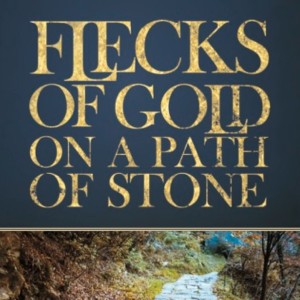
Thursday Mar 13, 2025
Thursday Mar 13, 2025
"Flecks of Gold on a Path of Stone - Simple Truth's for Life's Complex Journey" - Part Four
Did you ever have one of those surreal moments when it seems like something snaps in your head and suddenly you see everything like you never saw it before? Have you experienced those times when things unexplainably shift and they don’t look at all the same as they did only a moment ago? When what was entirely familiar is no longer familiar in quite the way that it was before?
A lot of things can trigger these moments . . . an argument, a child leaving the home, a death, a job loss, a divorce, a birthday, unexpected contact from a long-lost friend or any number of similar events. In the middle of whatever this is, you’re suddenly able to see the reality of your life with a stunning, nearly razor-sharp clarity that you’ve never had before. It’s kind of like you were blind and you didn’t know it and in the briefest nanosecond, for the briefest nanosecond you were granted stunningly perfect vision. And with that perfect vision, everything looks perfectly different.
Suddenly, what we now see is familiar but strangely unfamiliar at the same time. We intimately know everything that we see around us but it’s entirely alien just the same. It looks different or not quite right. It’s my life but it’s not my life, or at least what I wanted my life to be. It’s what I’ve been living all along, but at the same time it’s not what I’ve been living, or what I thought I was living.
And we stand there rubbing our eyes because what we see is not stuff we saw before, or at least what we saw with the clarity that we see it now. In the emotional turmoil these rare moments create we’re often left asking “who am I and where am I?” And in the briefest nanosecond, in exactly the same way it came, this vision is gone. However, the memory of what those few incredible moments revealed is anything but gone.
What times like this most often reveal is the paralyzing reality that we are not where we intended to be. This was not the destination that we had mapped out as pimply-faced teens or adventurous young adults or giddy newlyweds. The line that we had drawn from those younger years forward in time didn’t go where we’re at now, or weren’t supposed to go here; to this place that we now realize we are. We never really considered the heading on our compass. And now we pick it up, shake it to make certain it’s actually working and we’re left realizing that it’s working perfectly but we didn’t follow it. And now we stand at some point far removed from, and possibly decades away from where we were supposed to be, or thought we were supposed to be.
What hits us really hard is that we didn’t fully realize the deviation from the path that our dreams had laid out so long ago. We got here and we didn’t even realize that we got here. But now we know it. And we’re standing deflated, attempting to figure out where we got so terribly off course, all the while madly calculating how many years we have left, and how many responsibilities we have on our plate in order to determine if we have the time and the freedom to ever get back on course.
Worse yet, some of us don’t even remember what the course was in order to retrace it. Others of us never set a course for ourselves in the first place; having allowed the winds of life and the currents of circumstance to bring us here. Whatever the case, there is this chilling, haunting sense that we are not where we wanted to be, and that the path intended to take us there may now be forever forfeited. We fear a life squandered. And the question wildly reverberates in a near panic, “how did I get here?”
I Am Where I Am
At these times we can certainly pull out our tattered life map, grab whatever compass we’ve used over the years, or review the saved settings on our personal or relational or spiritual GPS. We can then hunker down over the topography of our past trying to scrawl out the line that brought us here. We can do all of that. And in doing that there may be value.
However, we are where we are. Like it or not, we’re “here,” wherever “here” is. First, the task is really about determining exactly where we’re at in order to get some sort of bearing on our life. After that, we need to determine where we want to go. Then we need to determine do we have the time and the resources to get there. It’s not about bemoaning where we are. Certainly we can make room to do that for a bit if that gets it off our chests. It’s really more about grabbing hold of our lives and planning a strategy to take us where we want to go.
Where Am I?
So where am I anyway? Not where I think I am or necessarily perceive myself to be or have deluded myself into believing I am. But where am I . . . really? It may be a tough or even painful thing to think about. It may be harder to accept and embrace. It’s likely that not thinking about it was a major contributor to getting you here in the first place. So look around and be chillingly honest.
Embracing where we’re actually at will likely involve grieving time and opportunities lost, anger that it happened, disappointment in that we let it happen, frustration that we weren’t attentive enough to keep it from happening, confusion over how it happened, and a host of other weighty and powerful emotions. Our desire to avoid these may result in a less than honest assessment of our location. However, such a less than honest assessment of where we’re at will entirely undermine any ability to reclaim lost dreams and dashed hopes.
Where Do I Want to Go?
Where I want to go is not about running from where I am. Sometimes our destination in life is determined by our desire to get away from where we are. If fleeing our present place in life is what drives us, we’re likely to make poor choices about where we want to go simply because the motivation is not entirely adequate.
Second, where we want to go does not necessarily have to be a radical resurrection or reconstitution of our old hopes or dreams. We’re in a different place under different circumstances with different realities and different responsibilities than we had way back when. It’s more about re-evaluating life and asking fresh and new questions about where we want to go.
Third, we may find that we really shouldn’t go anywhere at all. It may be that we should commit to build upon and expand where we are. Investment and renovation in the very place we’re at may result in the exact life we’re looking for. Where we want to go may very well be utilizing the resources that we have right here and shaping them into something that we didn’t ever consider they could be.
Do I Have the Resources?
Some resources we have less of, like time. Other resources we have more of, like maturity and knowledge and experience. It’s about assessing our resources and realizing that we likely have more resources at our disposal than we did in the earlier years; we just don’t realize it. Then it’s about pooling and maximizing those resources into whatever endeavor we feel directed toward.
Have You Considered . . . ?
In reality, most of us end up someplace other than what we intended. Life is not so smooth or manageable as to chart direct courses on tidy timelines. It’s more about recalibrating and making course corrections along the way, believing that life is a journey that takes us off course at times, but provides us resources to likewise alter those courses. Not where you want to be? Think about it.
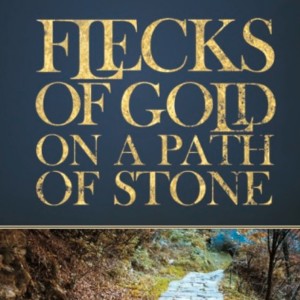
Tuesday Mar 11, 2025
Tuesday Mar 11, 2025
Flecks of Gold on a Path of Stone - Simple Truth's for Life's Complex Journey" - Part Three
The concept of sacrifice seems more suited to novels or epic movies. It appears more an ideal; a concept that when observed from a safe distance seems wonderfully heroic, deeply inspiring and chivalrous in a way that stirs up something powerful in us that seems to be forever held hostage despite the fact that it gets stirred. Sacrifice, as we watch it displayed from afar, awakens some internal passion that chafes against our souls in its quest to be unleashed within us.
Somehow sacrifice seems to be something that is entirely right, that is likewise entirely lost. There are those things that we believe exist yet are lost to mankind; the things we are ever in search of not because we are caught up in some sort of shallow fascination with them. Rather, there are those things that we know to be authentically real whose absence must be remedied by their discovery. There are those things that we are made for, yet which are entirely absent.
Sacrifice is one of those things. It’s something that we know we are all called to. It’s one of those things that we know is the right thing to do; that it’s part of our humanity and represents something undeniably central. Sacrifice is the totality of our humanity called upward and outward in a grand display of selfless behavior. It declares that we are not made solely for ourselves, but that we are made for others. It captivates our minds and catapults our actions to do things we never dreamt possible. Indeed, it defines the core of our humanity; representing the ultimate action that one human being can take on behalf of another human being. That’s sacrifice.
The Balance of Sacrifice
All of this doesn’t mean that our lives are always about other people. It’s simply about priority and the arrangement of things in our lives. Our culture, and in many cases our world seems bent on maximizing our personal gains in any situation. There appears to be an inherent mentality that the self can be sacrificed, but only to the degree that the self is not actually threatened, or threatened beyond likely recovery. Sacrifice is calculated and made clean. Certainly, we must exercise wisdom when we take actions on the behalf of others, but a clear set of priorities would seem to dictate the manner in which we act with others in mind.
Priorities
It seems that our actions are dictated by our priorities. There appears to be this inherent grid that we run decisions through. That grid seems primarily to hold the welfare of self above everything else. Clearly, that seems to be in keeping with the natural tendencies and behaviors of base human nature.
Yet, there is a sense of some deep sort that runs entirely contrary to human nature; that in putting ourselves first, we must by necessity put others first. There’s some sort of sense of community, of relationship and connection that deems us only a part of a much large whole. And as a part of that larger whole, we are obligated to preserve the whole above the preservation of self. That dichotomy all seems rather strange because it appears to run against our natural inclinations to make certain that we’re okay and that our personal interests are protected.
What’s the End-Game?
We all ask where we want everything to end up. At the end of it all, when our days are over and the fullness of our time, talents and energies are spent what will be left? That’s a terribly big, and in some cases, a terribly frightening question.
If our focus is upon ourselves, then the end results of our lives will be likewise focused on us. The benefits and resources that we will have garnered and spent will serve us and us alone. That might make for a life that we perceived as satisfying and a good ride, but it ends at our end. The service of self terminates at our own death. Therefore we will have left nothing that outlives us, nothing that serves the greater good, nothing for those who remain. It would seem that the end-game is indeed the end-game in a manner tragic and unfortunate.
What about Legacy?
What kind of footprint will each of us leave? Will it be big enough and broad enough that others are enriched by it and find both comfort and inspiration in it? Will it have changed lives, redirected people who were on crash courses to their own destruction, or given someone somewhere some degree of hope in a place where they saw none for themselves? Will our legacy live on, not just for the purpose of living on but for the purpose of giving others purpose? Are we committed to leaving something of value behind that will cost us, but will in turn be of inestimable value to someone else, someplace else? Or are our lives spent in the service of self which means it all begins, and more tragically ends there?
In leaving a legacy, we can’t be so shallow as to leave a legacy of who we were as some sort of monument to self. Monuments are not legacies, they are simply reminders. A legacy is leaving something to others for the sole purpose that it gives them something valuable and needed in their own journey whether we are given the credit for that or not. It’s a selfless detachment where we hand another human being something that may very well be life-saving without them knowing its origin or being able to credit the one who gave it to them. It’s a gift that is given for no other purpose than the nature of the gift and the recipient who will receive it; the giver being entirely lost in the transaction. That is sacrifice.
How Will I Live?
Sacrifice . . . it runs contrary to who we are, but it is in reality everything that we are. The pinnacle of our humanity is ascended when we descend in the service of others. We are raised up when we lay ourselves down. It builds us, it builds others, and it builds families, communities and nations. Sacrifice is the best of our humanity manifest in shining moments when everything that would diminish us is overcome and set aside. It is all of us at our very best. So how then will you live?
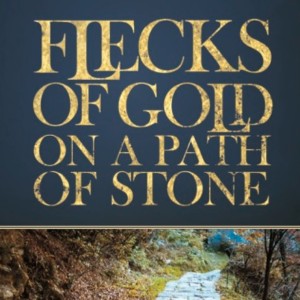
Thursday Mar 06, 2025
Thursday Mar 06, 2025
Flecks of Gold on a Path of Stone - Simple Truth's for Life's Complex Journey" - Part Two
Forgiveness often seems to be one of those things that’s a genuinely nice idea, but not really a life liberating reality. Life is full of nice ideas; those trite sayings, gentle stories and brave concepts that would make life a whole lot better if they were really real. Nice ideas often seem to be spun of the threads of idealism and the fabric of fanciful thinking. The reality is that they don’t really seem to work in the real world. Sometimes the very things that we wish were true simply dissolve and disintegrate when the reality of life hits them. Forgiveness seems to be one of those things.
Sometimes the greatest, most profound truths seem to be the very things that are completely removed from the reality of the lives that we live. In reality, it’s not that they don’t fit or are idealistic or naïve or far-fetched. Most often it’s simply the fact that we don’t know how to incorporate them. Sometimes the greatest truths are so big and so encompassing that we can’t figure out how to figure them in. And because we can’t somehow make them fit, we assume them to be irrelevant, weak, inadequate or just plain stupid. Such often seems the fate of forgiveness.
The Oxford English Dictionary defines forgiveness as “to grant free pardon and to give up all claim on account of an offence or debt.” The American Psychological Association expands the definition of forgiveness “as the process of concluding resentment, indignation or anger as a result of a perceived offense, difference or mistake, and/or ceasing to demand punishment or restitution.” Whatever your definition might be, forgiveness is about letting go in a manner so total that the offense and the restitution are released.
Obstacles to Forgiving
Forgiveness is a releasing which makes it difficult on at least three basic fronts. First, we typically demand restitution be obtained or that justice be meted out for whatever offense we have incurred. There is a deep sense of justice that demands correction of an offense through some sort of action that both compensates us for whatever loss we’re sustained while teaching the offending party that such actions are inappropriate and intolerable. The act of forgiveness works against this feeling, making forgiveness difficult and contrary.
Second, forgiveness creates a perceived sense of vulnerability. If we “grant free pardon,” do we then open ourselves up to have the same offense perpetrated upon us again? Are we giving space and opportunity for the offending party to do to us what they did before? In forgiving, have we relinquished power that we can no longer hold over the person who offended us in order to keep ourselves safe or make them pay?
Third, we see forgiveness as letting someone ‘off the hook.’ It’s a free pass, a mulligan, a turning away where we permit ignorance to erase that which should not be erased. We feel we do an injustice by not handing out justice and instead waving off an offense in a manner that seems both irresponsible and ignorant. Forgiveness is often seen as an easy way to resolve or bypass something that should be dealt with.
What Forgiveness is Not
Forgiveness is not saying that the offense was ‘okay’ or somehow less than what it really was. It’s not watering down the offense or somehow sweeping the whole thing under the proverbial carpet in some sort of passive gesture. Forgiveness has nothing at all to do with avoidance or passivity. There’s nothing placating or escapist about it. It’s not an act of weakness nor is it a means to maneuver around that which we find unsavory or downright scary. It is in reality an act of the utmost strength, the highest form of sacrifice and the deepest manifestation of our humanity.
The truth is, it’s simply saying that to hold the offense against the person is simply too toxic for the one holding it. We will be offended and we will take hits that are deep, searing and violently cutting. When that happens, we must have an alternative to holding them. There must be a release of some sort. Holding the offense stymies the one holding it, therefore not allowing the offended party to move on. Forgiveness makes nothing ‘okay.’ It’s not about that. It’s about creating freedom and release in manner that nothing else affords us.
Neither is forgiveness a means of giving the offending individual permission to reoffend. Forgiveness comes with the understanding of the nature of the offense, as well as the establishment of boundaries to keep the offense from happening again. Forgiveness is not permissive or passive. It’s not about being an inflatable punching clown that pops up for the sole purpose of taking another hit in an endless series of hits. It is an intentional act of release, not an act of permission.
What Forgiveness Is
The old saying is quite true . . . forgiveness is more for the one who forgives than for him who is being forgiven. In forgiveness, we choose to let go of the emotional toxicity that harboring anger over an offense breeds. We are not granting permission to the offense or minimizing it. Forgiveness is an act of personal liberation where we are setting ourselves free from whatever was done to us. It is not an action that invalidates the offense. Rather, it is an action that leaves the consequences of the action between a just God and the offending party while freeing us up to move on with our lives. Forgiveness is a choice to leave the past with those who created it so that we can move on to a future yet to be created. It has nothing to do with weakness and it has everything to do with strength.
The Hardest Person to Forgive
In all of this forgiveness stuff, the absolutely hardest person to forgive is most often ourselves. There’s some sort of blockage when we are the one in need of our own forgiveness. There’s something doubly binding when we are both the offending party and the one extending forgiveness all wrapped in one. The duality of all of that puts us in two roles at the same time, making forgiveness doubly difficult.
Despite the inherent difficulty, it’s right here that the greatest grace (unmerited favor) needs to be extended in that we embrace both authentic remorse for offenses we’ve incurred while extending ourselves the full release of forgiveness. Something about this dichotomy is terribly difficult, holding many hostage to mistakes far in the past that dim or even rob the hope of the future. Forgiveness is inherently powerful enough to extend itself wholly and completely to us even when we are the ones in need of forgiving ourselves.
Freeing Ourselves
What are you holding onto and why are you doing it? If you look closely enough you’re likely to see that the rationale for withholding forgiveness is far outweighed by the liberating release inherent in forgiving. Take stock of what you’re holding onto and consider the worth of holding it verses the freedom found in releasing it.
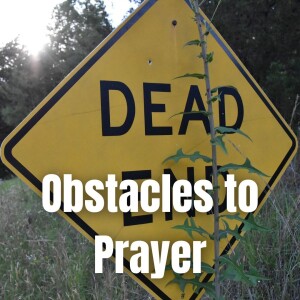
Wednesday Mar 05, 2025
Obstacles to Prayer - Taking It to Our Knees
Wednesday Mar 05, 2025
Wednesday Mar 05, 2025
Obstacles to Prayer
LifeTalk
“I want to live a life where prayer is the first thing that I do, the second thing, the third thing, and the last thing after the prayer has been answered.”
Craig D. Lounsbrough
Many of the obstacles to prayer are things that we have not given sufficient attention to, or we think that they’re somehow normal, appropriate, or of no real concern. These are the things that present themselves as rather casual issues that are of little importance. But they can (in fact) be major obstacles to an effective prayer life.
In this podcast we’re going to outline a handful of these destructive factors that too often lay hidden in our lives. And in wondering how or why our prayer lives seem so ineffectual or hollow, we might ask if any of these factors have found a place of residence in our lives.
Obstacles to Prayer
Sin.
Sin is an intentional living outside of the will of God that places us at odds with who God created us to be. Sin is described as “anything that separates us from God.” If we are engaging in such behaviors, we come to prayer already separated from the God to Whom we are praying.
Self-Centered Agendas.
We tend to live out our lives based on our agendas and our perception of what is in our best interest. Therefore, we do not come to prayer seeking God’s direction, God’s will,
God’s insights, or God’s perspective. Rather, we come with a prepared agenda where we wrangle with God in order to achieve these agendas or obtain the resources to achieve them.
Distractions.
Prayer becomes the thing that we squeeze into the many demands in our lives. It’s something that sits somewhere near the bottom of the rather extensive checklist that outlines our obligations and duties. We intend to give prayer space and time, but it often falls prey to the many other demands that press prayer off of our calendar.
Shiny Object and Squirrels.
There are many things that vie for our attention. In reality, most of those things are not imperative to life and living, although we grant them that exact status. It’s often assumed that if something in our life demands our attention it’s because ignoring it will have dire consequences, when in fact deferring the majority of these things is unlikely to result in any consequence of consequence. As such, in the perpetual bombardment of an unnecessarily busy life, prayer is easily set aside.
Lack of Faith.
We are lacking in faith. The lack of faith either inhibits our prayers as we feel that we bring very little to the process, or we bring little to the process because we don’t necessarily believe in praying anyway. We must remember that the size of our faith only becomes an issue when we refuse to use the faith that we have. So, use the faith that you’ve got to increase the faith that you don’t have.
Unmet Expectations.
We come to prayer with expectations regarding the outcome of our prayers. If those outcomes are not achieved, we feel that prayer is ineffectual or irrelevant. If it fails to generate our prescribed outcomes, we’re quick to label prayer as irrelevant or entirely powerless. Our assumptions rest in the belief that our expectations are the ones that are right for our situation, rather than being the one’s that we should explore in order to determine what might actually be right for us.
A Jaded Heart.
We feel that God has not answered our prayers in the way that we wanted, or in the time frame that we wanted, or maybe He didn’t answer them at all. We have found God disappointing, demanding, less than generous, absent, or a God that crushes our desires despite how passionately we bring them to Him. We refuse to understand that God cannot fulfill many of our desires because it is the fulfilling that would do the crushing. Therefore, we either refuse to pray any longer, or we do so in such a limited fashion that it can barely be defined as prayer.
The Lure of the World.
The world is full of enticing things that have no depth and lack any substance whatsoever. And therein lies the absurdity of it all. We chase after that which we believe will do the things that we’re chasing them to do. And once we actually catch them (or in some cases realize that we can’t because nobody does), we’re struck with the reality that these things weren’t what they appeared to be, or they didn’t possess the resources that we had errantly endowed them with.
The Insurance Policy.
Is prayer some supplemental thing that we do out of guilt, or a sense of obligation, or to cover the holes that we might have left in our efforts to tidy up our lives? Is prayer that safety net that we keep in place just in case the world fails us, or we fail ourselves? Is prayer that supplemental insurance policy that we hold onto ‘just in case?’ Prayer is not insurance. Rather, it's the assurance that we won’t need insurance.
There are many things that create obstacles to our prayer. And we would be wise to thoughtfully inventory our lives and ferret out anything that would create and sustain any such obstacle regardless of what it might be.
You will find all of these outlined in my book, “Taking It to Our Knees – Rigorous Prayers for Life’s Greatest Challenges.” This book is a fresh, entirely relevant, and thoughtfully targeted thirty-day devotional that will bring the power of prayer to ‘life’ in your life. You will find “Taking It to Our Knees” on Amazon, Barnes and Noble, or wherever books are sold.
You will find LifeTalk on most podcast platforms as well as YouTube. I would also encourage you to check out our daily posts on all of our Social Media sites.
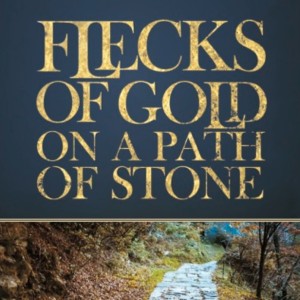
Tuesday Mar 04, 2025
Tuesday Mar 04, 2025
"Flecks of Gold on a Path of Stone - Simple Truth's for Life's Complex Journey" - Part One
We yearn for security. There is an inherent need deep within the fiber of our being that desires to be able to lean on and lean into the things around us, knowing with steeled assuredness that they will hold us firm and steady. We want life to be safe because we have a passion to engage life. And to engage life out to its furthest edges, we must of necessity step out of ourselves and into that which is around us. We have to step up, step off and step out. Any real journey is of necessity a journey beyond ourselves. A robust journey unapologetically takes us outside of all that we are able to keep safe, into that which we cannot. To do that, we by nature need some degree of safety in the endeavor.
Not only do we naturally yearn to lean out into life, life at many junctures demands it, and a real journey is not possible without it. Life frequently arrays itself before us in a manner that forces us to trust; to moderate or marginalize caution and to step out onto ground or relationships or circumstances that have not entirely convinced us of their certainty or safety. Sometimes we have to step out into things that are not of themselves safe at all.
Yet, if we are to journey, we must step out into these things. Likewise, if we want to embrace everything there is to embrace, we must step out into and onto all of these things for most of them do not necessarily come to us. We must of necessity go to them; extending not only the effort stepping out, but taking the entire initiative of seeking them out as they move either largely hidden or complete obscure. Life most often calls us outward. It beckons with grand and rich invitations that hold out the promise of growth and great adventure. But it does not always come to us with those invitations. We most often must go to it. The hard evidence of our passion for the journey is illustrated in our willingness to chase it however elusive it might be.
The Risk in it All
Life however is terribly imperfect. It seems that there was some grand design that granted us tremendous ability and then graced life with tremendous opportunity. There seems to be shadows of some great correlation where we were equipped to do great things and then life laid out great resources and ample space within which to do those things. The chemistry of it all made life something potentially grand.
Somewhere the whole marvelous arrangement seemed to have gotten marred. Somehow it was apparently damaged. “For the wages of sin is death” (Romans 6:23), which is the ultimate loss of the ultimate gift. The original intention of grand opportunities remains, but it now has to overcome obstacles, barriers, and various difficulties. Life demands that we battle disappointments, cruel turns, unexpected twists and surreal pain. Life remains for the taking, but it now comes with risk; sometimes great risk.
Betrayal as Part of the Risk
Into all of this comes betrayal. Betrayal is a cruel reversal. It takes the trust entrusted and uses it for purposes contrary to trust’s intent. Trust is a powerful thing. It willingly bequeaths both power and vulnerability when it extends itself to another or to life. Without trust, the greatest things in life are simply not achievable. Trust pushes out the boundaries. It allows us to extend ourselves out into places we would not otherwise venture. Whether that trust is vested in the destination itself, who we’re journeying with, who we’re journeying for, or whether that trust is vested in ourselves, it must be present. Trust is the prerequisite to risk and without risk little can be accomplished.
Betrayal takes trust and cruelly uses it to the advantage or purpose of the one initiating the betrayal. The agenda is most often self-centered. It’s about using trust to achieve an agenda that trust was not extended to achieve. Betrayal is altering both the journey and the intent for which trust was extended. A great gift is used for a great evil against the giver. Something painful and at times barbaric is then perpetrated.
Betrayal at Its Worst
The greatest and most painful aspect of betrayal is the belief that the very action of betrayal is not betrayal at all. Betrayal dressed in love and trimmed with the façade of good intentions is the most barbaric of all betrayals; being in reality a double betrayal. It is where the betrayer is set upon betrayal in a manner hidden and cloaked. It is chillingly devious and it carries an impaling venom deadly to the one who extended the gift of trust.
There is also a deluded sort of betrayal where betrayal is seen as a correct course of action or a necessary agenda by the one initiating the betrayal. Betrayal is often justified or rationalized as something other than betrayal. At times the action is viewed by the initiator as healthy or appropriate or entirely just, and it is projected as such. It seems the right and necessary thing to do. Unacknowledged betrayal is the most damaging and destructive betrayal we can experience. It presumes a violation as no violation. In the face of great betrayal it pretends no such betrayal. We are then left with the betrayal itself and no means of resolution with the party who betrayed us because they see no violation. We are left not only damaged, but we are left entirely alone with no means of justice with the betraying party.
Coping with Betrayal
Betrayal wounds deeply and its effects are lasting. Yet it has come into all of our lives and it will come again. There are several ways to cope and heal.
First, we must recognize that betrayal is not our fault. We may have done things that have been damaging or inappropriate, but nothing justifies betrayal. Despite whatever our actions were or were not, betrayal is not appropriate. There are always other means to deal with life issues. Other options exist.
Second, betrayal is often another person attempting to navigate their life circumstances. Sometimes those efforts are naively well-intentioned and based in ignorance or immaturity. Other times they are malicious, intended to force an agenda that the person feels can be achieved in no other manner. Either way, betrayal is the effort of an individual attempting to navigate some circumstance. Regardless of how or why it happened, it is inappropriate.
Third, betrayal is painful but it affords opportunity for growth. The farther down we are thrust, the higher we can rise. Betrayal pushes us to the darkest lows. These places, dark and cold as they are, create opportunities for us to grow to tremendous heights. Rather than embedding fear of people or life within us, betrayal gives us experiences and profound discernment to engage life with even greater risk knowing that our dramatically sharpened discernment provides us vision for a safer course.
Betrayal has likely come for you already. It may have visited you many times. You can be assured it will show itself again. Whatever the case, it can build you or diminish you. It will not leave you the way that it found you. Do not let betrayal betray you or your future. May you grow and be enriched because of it.
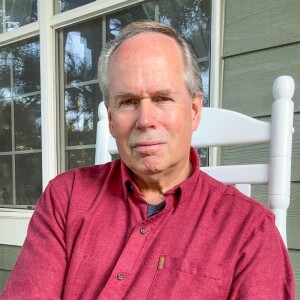
Thursday Feb 27, 2025
A Personal Testimony - Life
Thursday Feb 27, 2025
Thursday Feb 27, 2025
The odds that are we’ve never met, and if we have, I hope that I was able to leave something with you in the meeting as that is my passion and my calling.
My life has been devoted to helping people. You know, you start out with a vision to help people, and that vision is often pretty romanticized. In your mind you envision changing people lives, and because you are, you envision changing the world. It all becomes kind of heroic, and valiant, and courageous, and all of that.
But you soon discover that helping people (truly helping them), will ask everything of you. It’ll drain you. At times it will drive you to despair. You will look pain, and loss, and abuse, and hopelessness, and shattered lives, and addictions…you will look all of that stuff in the face, and you will find yourself questioning your ability to do anything about it at all. Sooner or later, helping people will leave you with some level of trauma, and there will come a time (more than one time) that helping people make you ask if the world and the people in it are simply beyond hope. Helping people will ask everything of you, and at times it will take everything from you.
As I sit with people day-in and day-out, I sit there with my own pain as well. My own life has been marked by pain, by personal devastation, by losses that I thought impossible to survive, by abandonment that left me devastated, and by disappointments that crushed me to the point that I thought that recovery (of any kind) was simply a fantasy that was too painful to fantasize about.
And so, I live the two sides of pain. Those of the people that I’ve served for over forty years, and that of my own pain. And there’s nothing heroic in that, as there are untold millions of people who set out each day to make the world a better place despite the wounds that they carry as they seek to heal the wounds that others carry. And to all of you who are the walking wounded who have given their lives over to help those others who are wounded, whoever or wherever you may be, you have my deepest admiration.
But here’s the point in all of this. Many people mock God as either someone who only exists in the feeble-minded or those who has to find security is some fabricated myth. Or if He does exist, he’s someone who’s incapable, or incompetent, or irrelevant, or out of touch, or outmoded, or inherently judgmental, or someone who’s failed us in entirely unacceptable ways…or however we’ve labeled Him.
But without hesitation, and without any sense of contrived religiosity, or syrupy idealism, or preachy verbiage, I can tell you that God is real. I can also tell you that I would not be sitting here without Him. And that’s not some cute or inspiring statement that’s supposed to trigger some emotion in you. It’s my reality. Life would have destroyed me without Him. God is my rock in every sense of the word. He is sturdy in the storm, both my own and those that I work with each and every day. He is in the turmoil, but He is above it. He is not the cause of our pain, but He is the solution to it. He is not some idealized myth created by weak people who can’t face the realities of the world. He is the greatest reality in all of the world. He is what you need. He is the everything in the middle of your nothing.
And I know this because I’ve lived it. More than once. In the pain. In the darkness. In the loss. In the confusion. In those moments of deep desperation. When hope is something that I just can’t believe in any longer because life has left no place for it. At those times in life when I can’t take the next step because I can’t get myself off of the ground so that I can try and take it. I know that God is all of those things because I’ve watched Him do the impossible in my life, and I’ve sat next to tens of thousands of people, and I’ve watched Him do the impossible in lives whose situations were nothing but impossible.
Our culture would deny this. In fact, it would ridicule it and do its level best to declare that all of this is the stuff of weakness, and foolishness, and stupidity, and ignorance. And all I know is that I’ve watched it work too many times, in my own life, and in the lives of others to know that it’s far more real than the culture that would say that it is not.
If you’re lost today. If your pain is deep beyond imagination. If you’re standing alone in the darkness that is always a part of being alone. If your dreams have died. If your spouse has left, or your child has rejected you, or your finances have collapsed, or hope has eluded you, or if you’ve come to the point that you look in the mirror and you despise everything that you see looking back at you…whatever your situation might be, there is a God that’s big enough to heal you, lift you up, restore you, grant you hope, lay a new future in front of you and grant you the energy to achieve that future. It is not impossible, for God is truly the God who pulls off the impossible.
And how do that I know that? How am I convinced of that? Because He’s done that for me. Because I’ve watched him do it for tens of thousands of people in over forty years of walking with wounded people. It’s real, and regardless of who you are and what you’ve done, or where you’re at, or how deep you’ve fallen, or how dark your circumstances might be, it’s available to you. Right here, right now. Today, tomorrow, and forever.
Grab a Bible. Find a church. Call a pastor. Get on your knees and pray. It will work. The road back might be long, but there’s a road. And God will walk with you every step down that road. Every step. May God find you in your despair, in your confusion, in your desperation, in your darkness, in your hopelessness. And may He create in you the life that you thought to be impossible, because that’s what He does. That is my hope, and this is my prayer for you.

